








Richard ENTERS the tiny eight-man cabin and drops his heavy rucksack on the floor. He is on board the cruiser Blücher. He is excited, but also very tired. A lot has happened recently.
The torpedo boat Tiger Richard came from the torpedo boat Tiger (1). By chance, he survived when his vessel sank after colliding with the German destroyer Z3 Max Schultz at high speed. Richard was serving in engineering. They were out in the Baltic Sea when the accident happened. Just before the collision, Richard was in the engine room with two others from the technical department. The time was 02:34. The shift was over and they were in the process of going through the maintenance procedures when Richard interrupted and went to his cabin to lie down. As he climbed up the ladder to the deck above, he turned round and closed the hatch. Seconds later, a deafening crash filled the room and Richard passed out. When he came round, he was lying in the sea, along with a lot of flotsam and jetsam and other crew. The Tiger had been split in two and was going down. Richard swam as fast as he could away from the two large pieces of wreckage that were threatening to pull more people down with them into the depths.
Some were injured. They were struggling to stay afloat. Desperate cries for help could be heard through the noise and smoke of the sinking vessel. The minutes passed slowly. Other German vessels arrived and helped where needed. It turned out that there were only two fatalities and six injured. The two who died had been with Richard in the engine room seconds before the explosion. The thought that he had hatch-
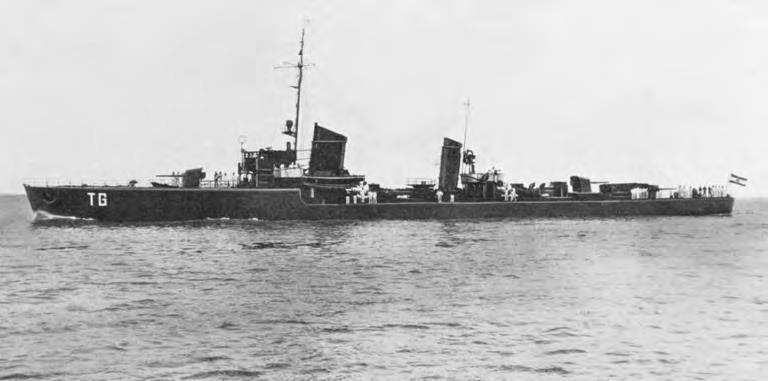
the hatch when he went up to the galley bothered him. Would they have got out if he had left the hatch open?
Inside the eight-man cabin at Blücher, he lets his eyes roam the small room in search of his locker. Richard slowly unbuttons his jacket. The nearest hammock looks tempting. He sits down in it and takes off his shoes. Rest at last! The last few days have been busy, with the journey to Blücher as a final effort before he can settle down in a place of employment, at least for a while.
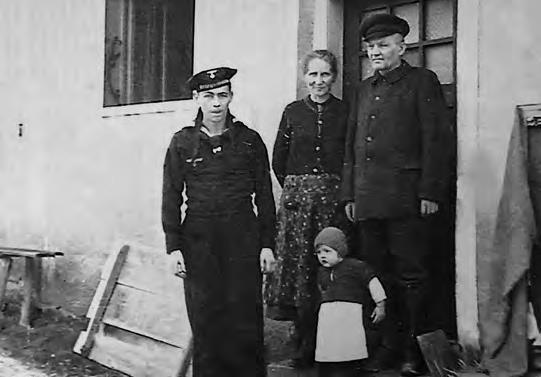
Richard closes his eyes and feels his body quickly calm down. Dull noises through the bulkheads indicate a high level of activity on the outside. He hasn't been given any tasks yet and takes the opportunity to rest a little. As he lies there, it suddenly occurs to him how much he longs for home. Home to mum and dad, his three brothers and two sisters. Home to security and a quieter life. He lets his mind wander.
After his confirmation and discharge from school in 1933, Richard began an apprenticeship as a mechanic at Kern in Tübingen. Three and a half years later, he completed his training. At the end of his apprenticeship, he worked at the Zanker company in Tübingen.
Full of vigour, Richard was looking for something to do. He was curious and wanted to do something completely different. After a while, he found himself in a gliding environment. He would like to learn to fly. Maybe he could become an aviator? The dream didn't last long. The chairman of the gliding club ruled with strict discipline, which Richard didn't like. He abandoned his dream of flying and set his sights on the navy. Maybe it could be something for him?
Richard will be registered
There's a loud knock on the door. Richard jumps and shouts: "What is it?" The voice on the other side of the door tells him to open the door and report for duty. There's a lot to be done on board before the cruiser leaves the harbour. With a pounding heart, he pulls on his shoes and opens the door. The person on the outside of the door is already gone. There's obviously a lot to do. Richard asks his way to the small office that organises everything that needs to be done. He announces himself: "3405/37 T, Richard Fleck" He meets the eyes of the man behind the desk, who immediately starts flipping through a thick book with a bunch of names. After a bit of back and forth, he finds Richard and ticks the column on the right-hand side of the sheet. With that, Richard is registered as a crew member on the cruiser Blücher.
Cruiser Blücher
He's going down to the engine room to familiarise himself and meet some of his future colleagues. It strikes him how big this vessel is. The torpedo boat Tiger was not half as long as Blücher! Three decks below him are the engine rooms. Others are on their way up the ladders. A small queue forms. "Bloody hell, there are so many people here," he thinks. Surely they can't all belong to this vessel? He makes his way and eventually comes down to one of the large rooms that houses the three large ship engines, totalling 132,000 horsepower. "Everything down here is big. It's enormous!
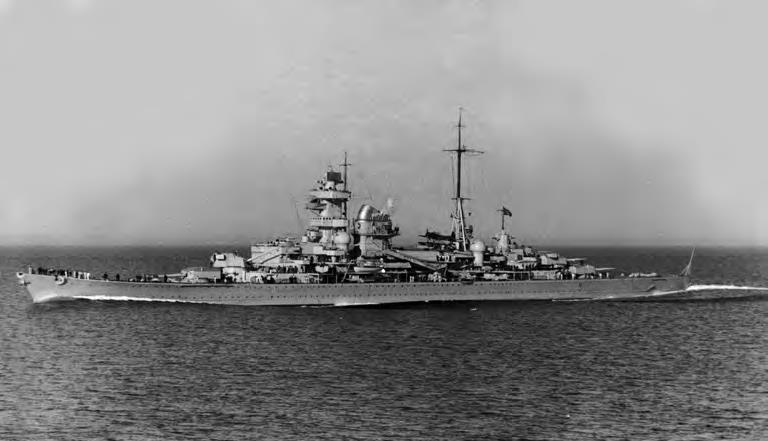
The 208 metre long cruiser could achieve a top speed of 32.8 knots. That required a lot of power. Richard stops to admire the part of the propulsion machinery he sees. "This armoured steel structure can't sink," he thinks, stroking his hand lovingly along the powerful steel plates.
Willi and Fritz
After a long day, Richard returns to his cabin. He has had a bite to eat. Satisfied, he hangs up his own hammock and dives into it with all his clothes on. Ohhhh, what a ship he's on now! Satisfied with where he is, he thinks about some of the new colleagues he has met today. The two boys of the same age, Willi and Fritz, he got on particularly well with. With a smile, he stands up and decides to get some fresh air on the deck. The Blücher is moored at the Seebahnhof quay in Goten harbour (2). As Richard opens the door onto the deck, the January cold hits him. It's a very cold winter and there's a lot of snow on the deck. Determined, he steps out onto the slippery deck and pulls up the collar of his winter coat. The boat cap doesn't provide much warmth, but it does prevent some heat loss. He looks out into the darkness on the sea side. From the lights on the quay, he can see that the harbour basin is completely covered in ice and snow as far as the lights reach. He stands by the railing and once again lets his mind wander back in time.

On 3 April 1937, Richard joined the labour service (RAD) at Horb. This was a service that all young boys had to complete for at least six months. Throughout the spring and summer of 1937, he was assigned to carry out excavation work in connection with turning. In the autumn of 1937, some of the boys were selected to work for farmers in the area, and Richard was one of them. He worked on the Bildechingen farm for the rest of the labour service. The service lasted until 23 October of the same year. At the same time, he had signed up as a volunteer in the navy, but he couldn't start there until his labour service was over.
Very pleased, Richard travelled to Wilhelmshaven (3) to report for duty. Once there, he had to present a recognised medical certificate showing that he was physically fit for life on board. He had also attended a swimming course at Uhlandbad in Tübin- gen (4), which was a requirement for joining the Navy.
The first six months passed quickly. There were a lot of new things to learn. The first six months were a probationary period with a mutual option to withdraw or be cancelled. The probationary period went well and Richard wanted to be in the navy. This meant that he had to
complete 12 years of compulsory service. On 1 November 1937, he signed the labour contract. Imagine ... permanent work for 12 years. This was secure at a time when unemployment was high and conditions were tight. The journey continued to Glückstadt (5). It was there that Richard received much of his seafaring education. Because of his background as a mechanic, he became technical personnel. He was then moved to the naval school in Wesermünde (6), where he took motor and electrical courses. It was after this training that Richard was stationed on the torpedo boat Tiger.
The cold bites his face and he decides to go back to the cabin. As he enters, he kicks off the snow on his shoes and folds down his coat collar. It's good to feel the warm air from inside Blücher against his body. It was freezing outside. Even now, after just one day on the ship, he is beginning to feel more "house warm". Those he meets on the way to the cabin smile and nod as he passes. He feels that he's going to thrive here.
Back at the cabin, the tension rises again. It's an eight-man cabin and he hasn't spoken to any of the others. He hears voices and laughter inside the steel door. Determined, he steps into the room and everyone's gaze is directed towards him.
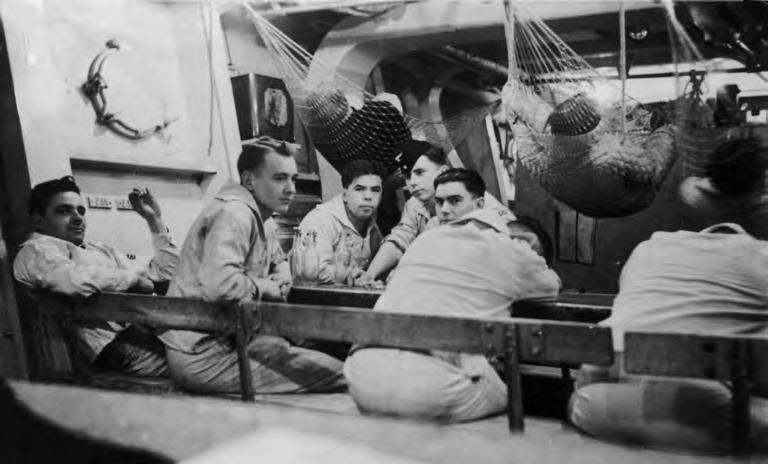
The others have been on board longer than Richard. He is delighted to see Willi, whom he met down in the machine earlier today. Willi Schlüricke actually has his hammock and locker next to Richard. How incredibly good! The other boys turn out to be very nice too. They tell us where they come from and what their days on board are like. Richard briefly tells them about his siblings and that he's a trained mechanic. The atmosphere is good, and just over half an hour later calm descends on the cabin. Two of the crew in the cabin are on duty. Two others are due up in a few hours. Richard hasn't been told whether he'll be on duty during the night, so he lies down in his bunk and quickly falls asleep.
The next day it's time to line up in the food queue for the crew galley. The line of men waiting for breakfast is long. The atmosphere is good. Jokes and laughter resound through the long queue. They have plenty of time to finish their breakfast. Richard stands together with the 169 cm tall Willi. They are on the same shift in the machine, and today there is a review of various procedures. There's a lot to familiarise yourself with. Willi has been on board for several months already, and Richard feels confident in him. The queue moves forward slowly, but mechanically. Richard sees the doorway to the galley getting closer.
Willi says that they have had some exercises in recent months, but that Blücher has constantly been in the yard for improvements. The latest changes were made to the
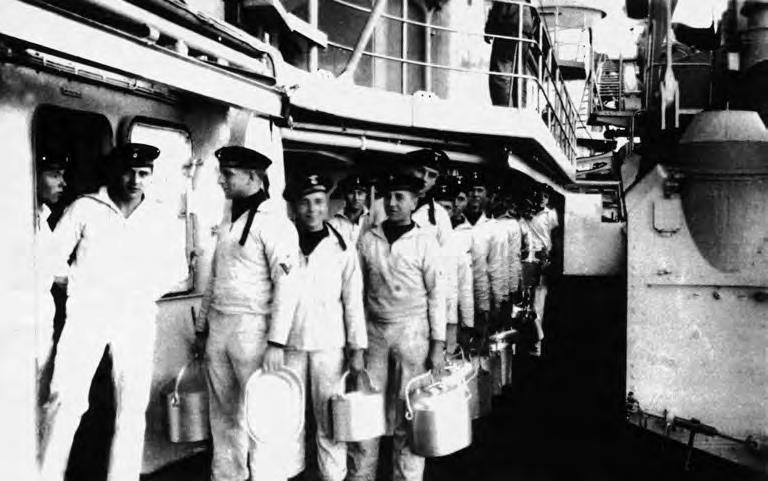
taken a few days ago. Willi adds that he thinks they will soon be going out on a small test run again to check out the final adjustments. He also says that there have been some problems with the compressed air system for measuring bunkers and tanks. "Despite frequent improvements at the shipyard, the system still does not provide satisfactory measurements. "It uses an unacceptable amount of air.
After breakfast, Willi and Richard make their way down to the engine rooms. Richard is clearly impressed by the size and power of the vessel. The Blücher has three propellers to ensure propulsion. Three propellers! They walk further along and reach the pumps that take in fresh water and fuel. Valves must be opened and closed manually. A little further on, the auxiliary engines that provide the electricity on board appear. Willi explains: "The emergency lighting in the engine rooms, especially in the boiler rooms, does not meet military requirements. It's strange that a new vessel isn't built to the required standards." Willi sighs exasperatedly. "Not only that," he says, "since this vessel entered service, we have discovered at least ten places where the ventilation pipes from the oil tanks are leaking. This was discovered quite randomly. The leaks occurred every time a tank was accidentally filled with too much oil. This happened because the compressed air system often failed." Willi flails his arms in frustration. "There are a number of things here that don't work despite the vessel being new. Unbelievable!" They walk further into the engine room.
Engineers, or lighthouse keepers as they are called where the vessel is powered by turbines, have many tasks on board. As long as an activity is associated with something mechanical, a lighthouse keeper is needed. When loading ammunition, food, consumables and the like, problems can arise with the equipment. Then it's up to the engineers to repair and get the equipment up and running again. When the equipment is not in use, the cranes must be maintained, readjusted and repaired. In a way, a boilerman is a mechanical "Caretaker". A fireman and an electrician must always be available on a vessel, whether it is at sea or docked.
It's during a night watch while Blücher is docked that Richard and Willi have time to sit down and have a proper chat. Willi explains: "I came on board here at 9am.
September in @or, so I remember well what it was like to be completely unknown and new. It's a big vessel. There are somewhere between 1,300 and 1,550 of us on board, depending on the mission we're going on," says Willi as he sticks one hand into a small sack he's brought with him. "Look at this! This is my diary. I've written down a lot since I joined the Navy. Would you like to hear it?" Richard smiles and says: "I'd love to." The guys have found themselves a corner near where the propeller shafts come out. They have rigged themselves up and are lying on some old cork mats they found stowed away behind one of the ladders. Willi lies on his side with his diary in front of him on the floor. Richard lies on his back with one arm behind his head and closes his eyes. That way he can visualise what Willi is about to say.
Willi turns to page three of the diary before he begins: "The first thing I have written is from the period 3 April 1939 to 30 April that year. I travelled from Fürstenwalde (7) by train at 10:48, and arrived in Ludwigshafen (8) at 20:10. From there, we were picked up in cars and driven to the camp. There, our physical and other characteristics were tested and assessed.
On 8 April, based on the results of all the tests we had undergone, it was decided where we would be allocated. I was assigned to the 2nd company as a machine gunner."
Willi continues: "On 18 April, our company was divided into smaller groups. After the distribution was read out, we were given our uniforms. So far, we had undergone basic training. The following day, 19 April, we started the training we needed to be able to serve on the various vessels.
The following day there was no school. It was the Führer Adolf Hitler's birthday, and for me it was a great experience. It was the first parade I took part in. On Sunday 23 April, we had our first film lesson. We watched the film "Traitor". Richard opens his eyes and says: "I saw that film too. No mercy for traitors!" "No mercy!" agrees Willi. Richard settles down and closes his eyes. Willi reads on calmly: "On Friday 28 April, we learned maps and compasses. We were transported to a large plain with almost no trees or other objects that could have helped us determine our direction. We had to assess the situation and discuss a sensible strategy using a map and compass. It was educational and fun.
On Sunday 30 April, we went on a tour of Wilhelmshafen. A giant crane called The "Long Heinrich" was impressive. It was 85 metres high and had incredible dimensions. "The Long Heinrich" was built in 1915. The crane could lift 250 tonnes. It was designed for use in the construction of battleships before the outbreak of the First World War. Do you know what Richard?" Willi looks over at Richard, who stands up in a sitting position. "The Long Heinrich is a floating crane. It's built on a kind of raft and can be moved wherever it's needed. Incredible!" Richard rolls his eyes.
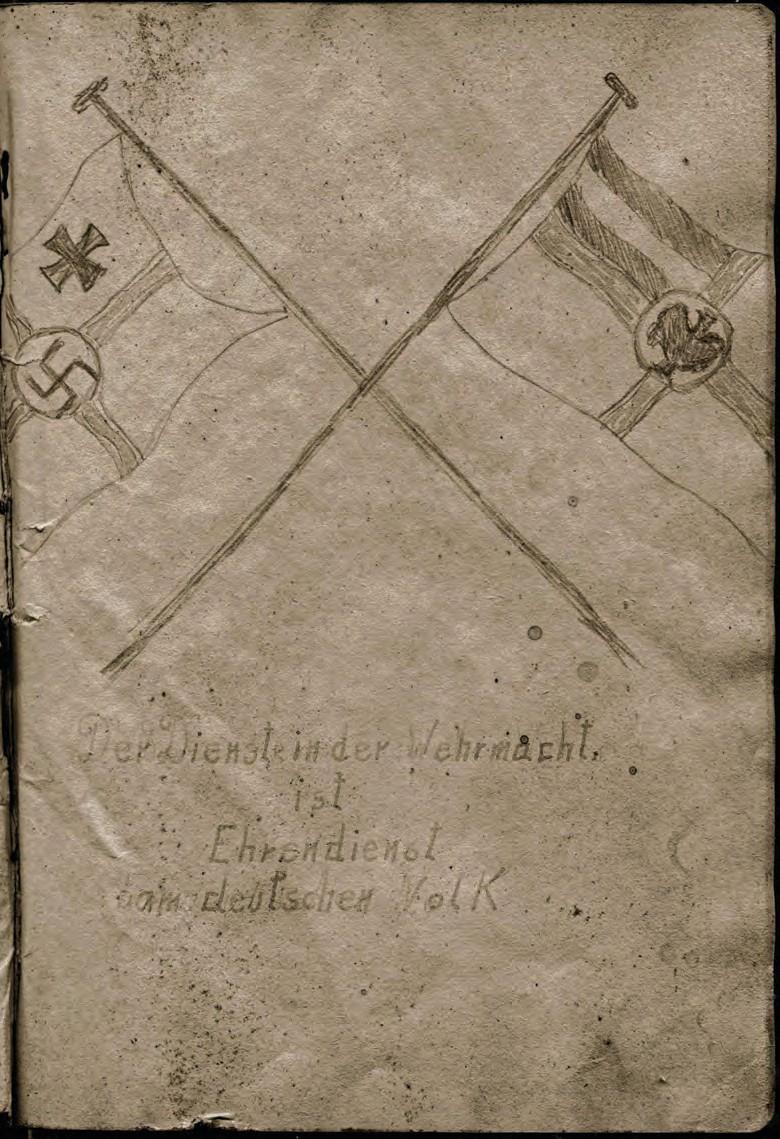
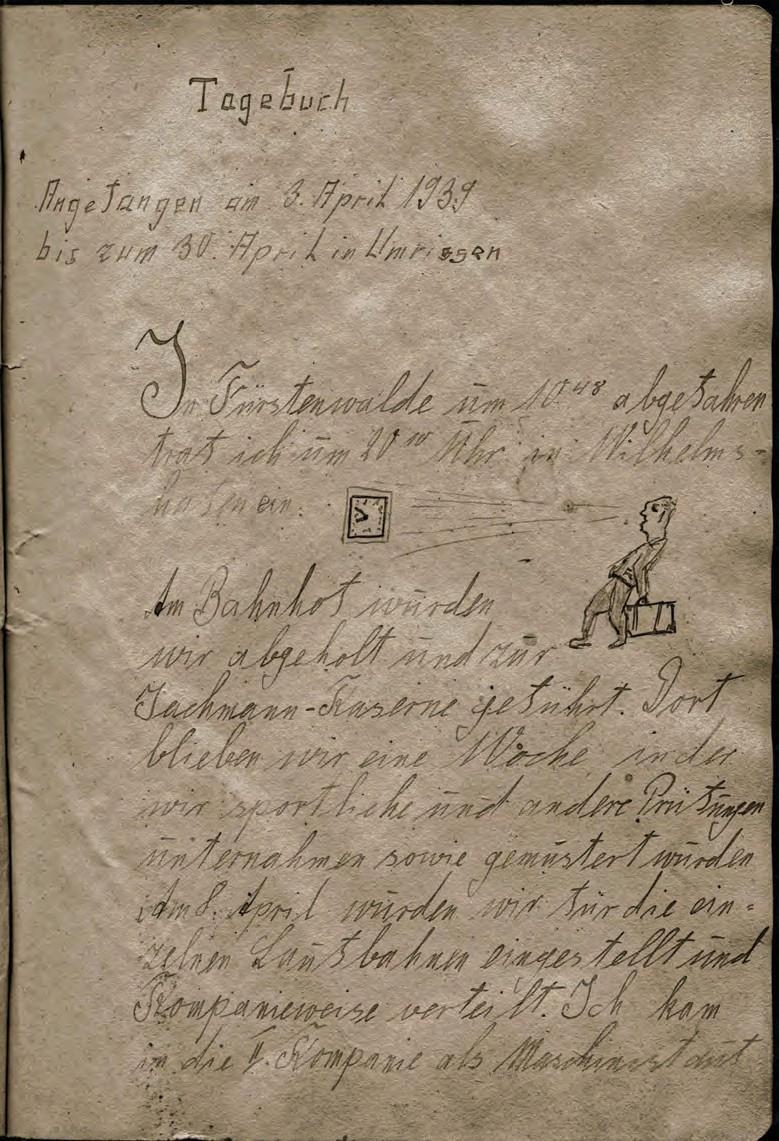
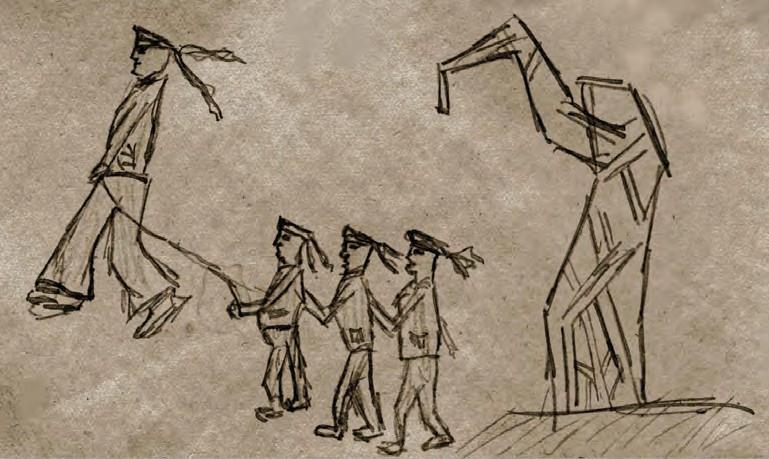
Willi continues: "I drew it in my diary, but there it almost looks like a giraffe." Willi laughs as Richard leans towards him to look at the drawing. He quickly flips over a page and continues: "Monday 1 May is International Workers' Day. On that day, we were at the barracks before watching an anti-Bolshevik show in the evening. The next day we marched to the shooting range. We were finally allowed to shoot with live ammunition. At the shooting range, there were strict rules that we all had to abide by. The shooting training was fun. Wednesday 3 May was a tiring day. We were out in the terrain and ran with the rifle. This training builds both fitness and strength. We used what we had learnt about maps and compasses. When we were going to shoot, we had to assess the terrain and make distance judgements. On 4 May, we had our regular indoor service. I felt bruised all over after yesterday's exercise. At the end of the day there was a joint immunisation.
The next day we were given gas masks. We then went to a training centre where we tried out the masks. It was reassuring to know that the masks and filters worked satisfactorily. "If we're attacked with gas, we'll be fine. When evening came, the company marched together to the garrison church to witness a blessing of a battleship. On 6 May there was a thorough cleaning. They were preparing for a rehearsal before the actual swearing-in ceremony. I cleaned my part so thoroughly that it was impossible for any dirt to remain.
Today, 7 May, we were given our service number. It told us who we were and what our area of expertise was. It was a big day for me. I felt that I was proud. If our girlfriends and wives had been here now, they would have realised that we had all become men
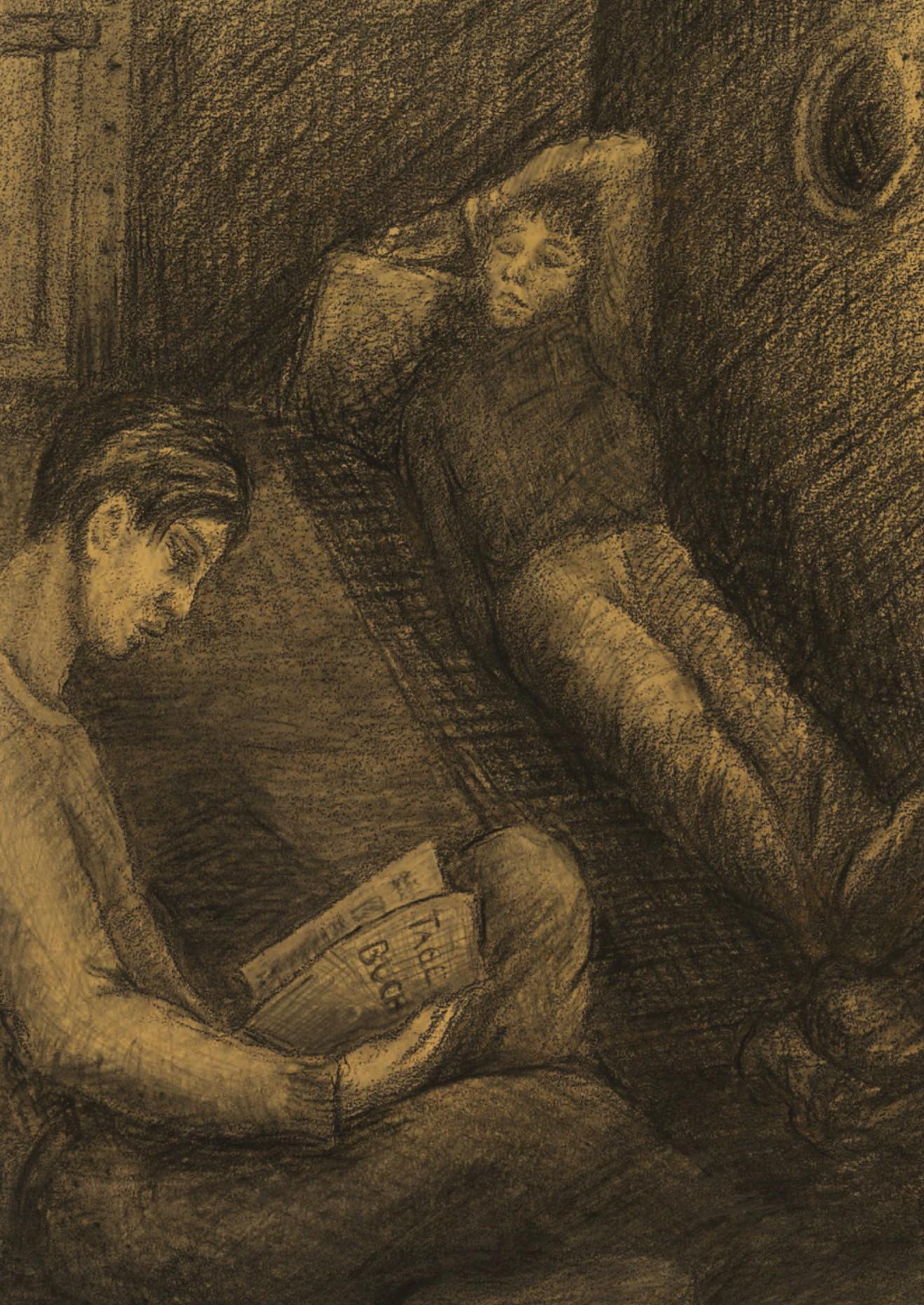
Willi is so engrossed in his own notes that he hasn't noticed that Richard has fallen asleep.
8 May started brutally with an alarm going off at four o'clock in the morning. The commander and the hiring officer stood and watched us. They wanted to see that we were ready." Willi is so engrossed in his own notes that he hasn't noticed that Richard has fallen asleep. Slightly disappointed, Willi closes his diary. He nudges Richard and makes him realise that it's time for guard duty. Richard notices that Willi is a little annoyed and carefully follows him. He doesn't want to get on Willi's bad side.
The next night they are on duty again. They do their rounds and settle down where they were the night before. Willi is in a good mood, and it's clear that he's gotten over his disappointment from the night before. "Have you brought your diary, Willi?" Richard makes it clear that he wants to hear more. To his relief, Willi smiles and pulls the book out of his bag. Richard lies down, but this time he lies on his side and doesn't close his eyes. He must not fall asleep again.
Willi clears his throat, swallows and starts reading: "The next few days we were out shooting and had more training in tactical moves. The company commander was with us all the time. He paid close attention. During one of the exercises, we practised charging and securing while running. No live ammunition was used in that part of the exercise. It's finally here! The most important day of my life. Friday 12 May. Today we had the swearing-in ceremony. Now we're ready! After the solemn ceremony, we got our first
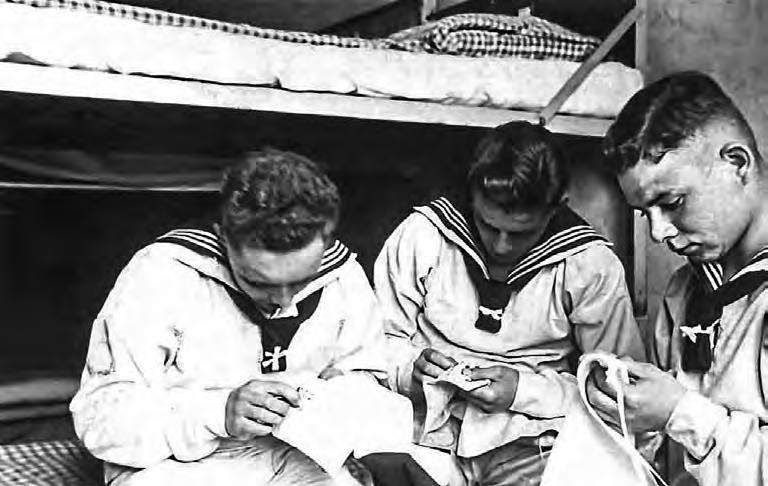
night off. The leave lasted until the morning of 13 May. The days are spent marching, polishing weapons and serving in uniform. Today I sewed all the labels with my name and embroidered the service number on the clothes I have. It was a boring but necessary job.
We have arrived on 20 May. The day started at 04:00 with a twohour march. We then visited the cemetery of honour where our heroes lie. In the afternoon, there was another extensive march. Name tag and service number of Willi Schlüricke. PHOTO: Johnny Haglund.
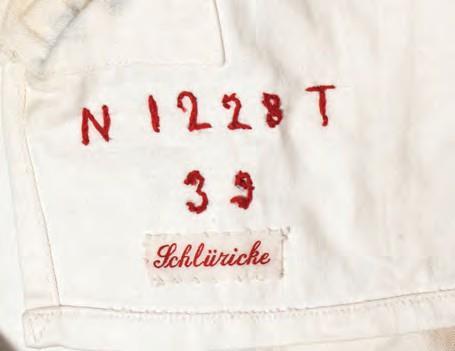
round of laundry. When the clock struck 18:00, my shift began. I was on duty together with Fritz Hilgemann. Fritz and I were on duty the next day too. It wasn't much fun when the other guys went out of the camp on leave and we had to stay behind, but this is a soldier's life and I like it." Richard interrupts and asks: "What did you do before you joined the navy Willi? You may have said it before, but I can 't remember." "I'm a trained machine mechanic," replies Willi as he continues to leaf through his diary. Richard continues: "Tell me about where you're from and a bit about your family". Willi stops flipping pages and puts the diary back in his backpack as he continues: "I was born 30 September 1919 in the town of Fürstenwalde. I grew up there with my father, Karl Schlüricke, who was a stonemason, and my mother Martha. I attended eight years of primary school and three years of vocational school." Richard nods and adds: "I also went to the vocational school in Kern in Tübingen. It took three and a half years to finish". Willi continues his story: "Otherwise, I've always enjoyed doing sports. In 1935, I passed the National Youth Sports Badge. It was incredibly fun! A couple of years later, I took the National Sports Badge. In the same year, I also managed to get the DLRG lifesaving badge (Deutsche Lebensrettungsgesellschaft, German lifesaving organisation)." Richard looks admiringly at Willi. Willi is a sturdy chap. The dark blond boy isn't particularly tall, but is stocky and energetic. Richard feels that the two of them are different types, but Willi is nice and he has "taken care" of Richard in these early days. weeks on board.
"What about you, Richard? What did you do before you came here?" Willi looks questioningly at Richard who begins his story. He talks about his family and what he did until he came on board the Blücher. Willi was clearly impressed by Richard's experience.
looking on board the torpedo boat Tiger. Imagine, Richard had been involved in a shipwreck. Not only that. Two people died, and Richard had been with them just seconds before the explosion! Willi was on pins and needles listening to the rest of Richard's story. "When did you come on board the Blücher?" asks Richard. "How long have you been here?" Willi proudly answers that before he came on board, he served in the 5th Company. He received basic technical training at the Marineschüle in Wesermünde. The school finished on 8 September 1939, and the very next day he boarded the Blücher. He has been on the Blücher for just over five months.
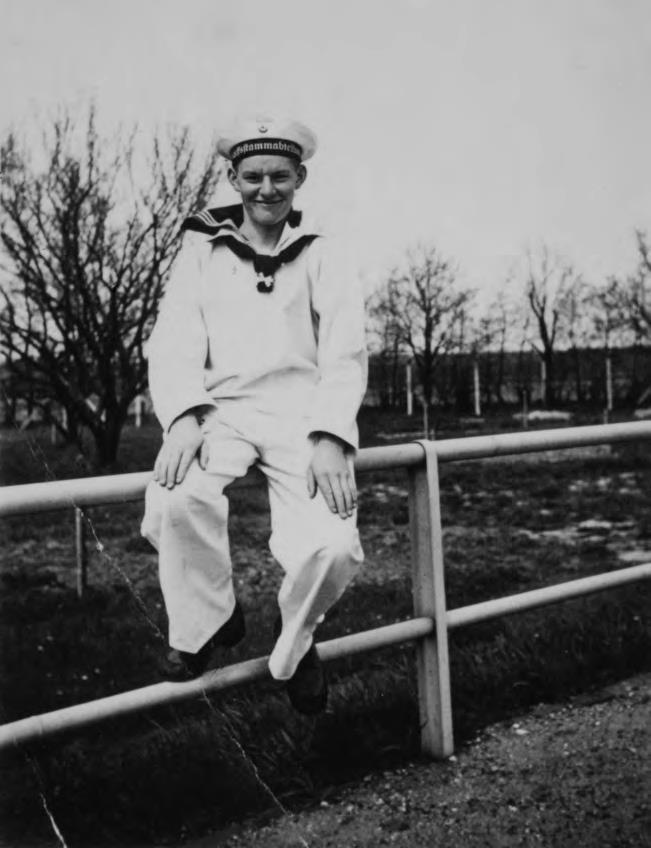
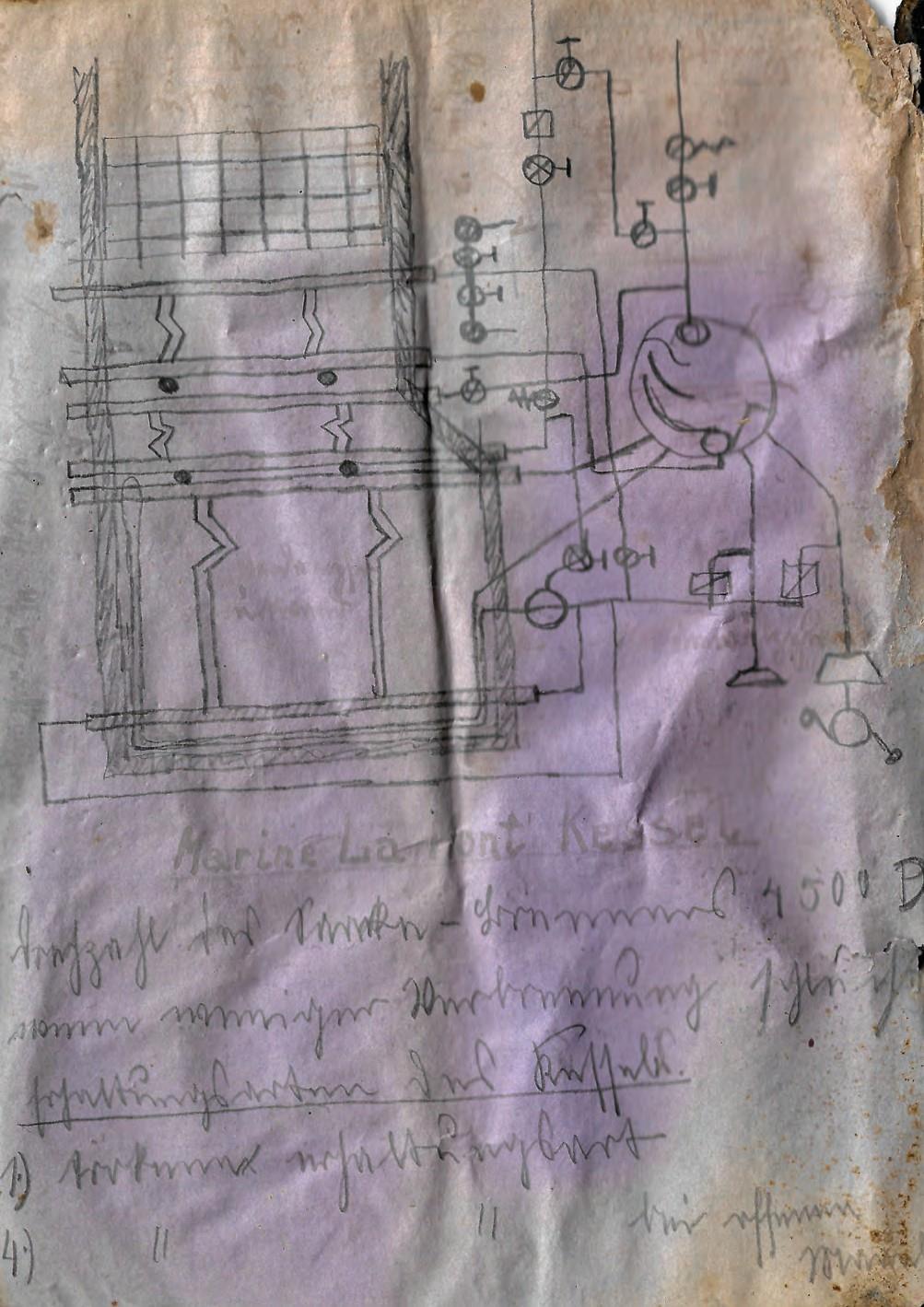
Here, Willi has drawn a sketch showing the principle of a steam boiler with circuits for feed water, steam and associated valves.
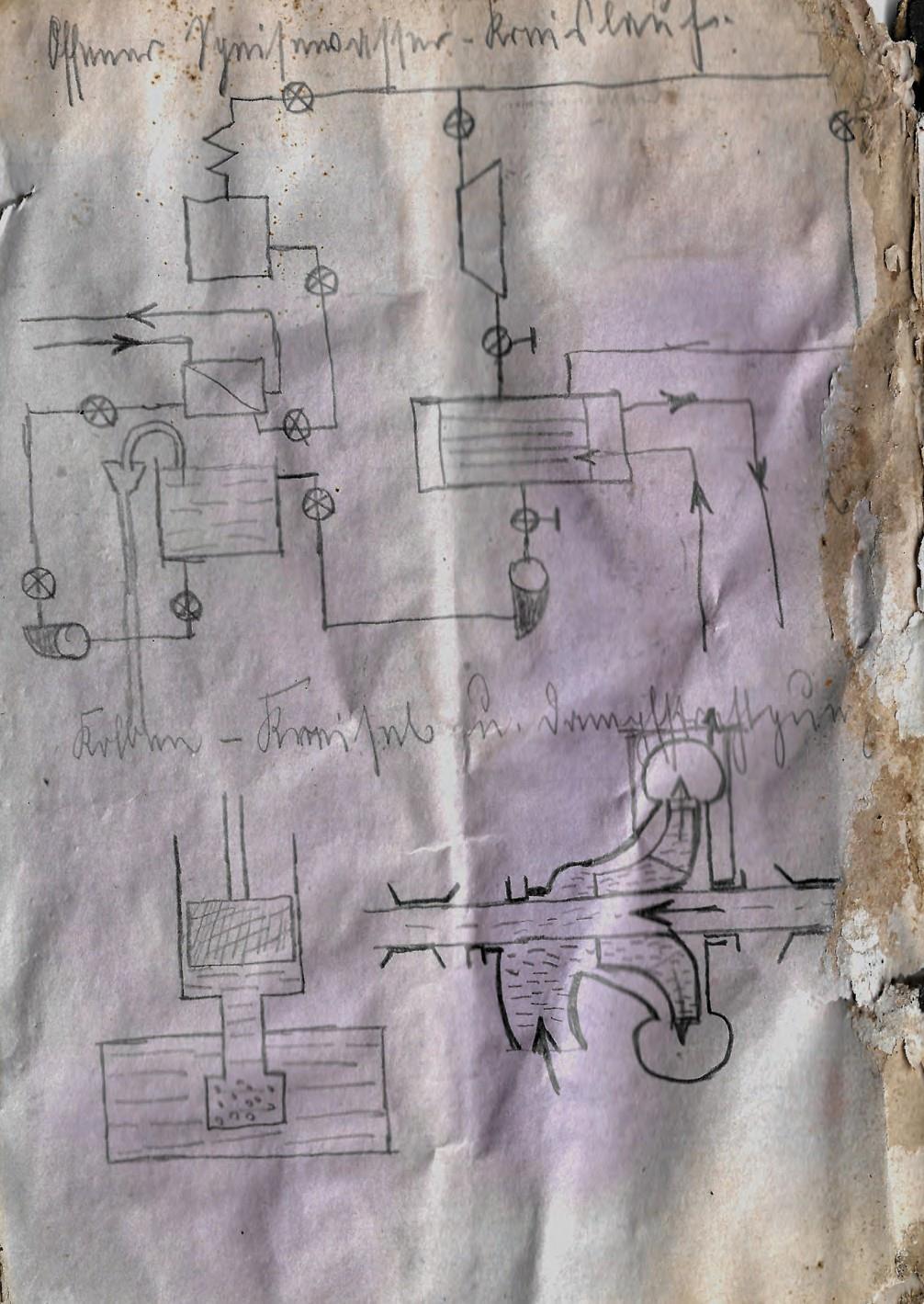
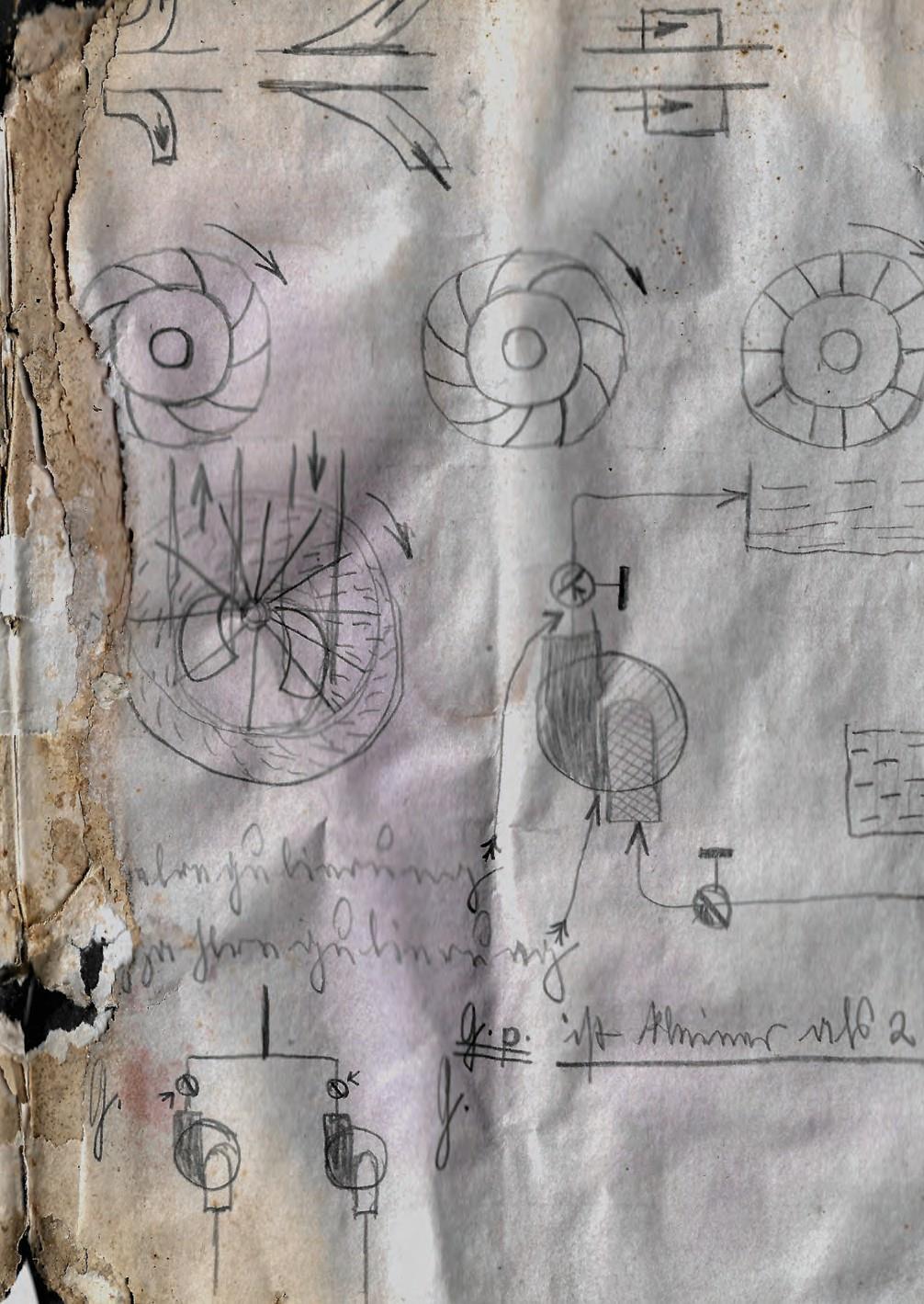
In the time that follows, Richard becomes more and more confident about the job he will be doing in the machine. He also makes good contact with Fritz. The days pass quickly, and he realises that there is "something in the air". Life on board is exciting, pleasant and safe.
Willi realises that Richard has become more independent in his role. He's also noticing more and more the big difference between the two of them. When Richard came on board, Willi felt he had to support and help him get started. Now it no longer comes naturally to have such close contact with Richard, which Willi is secretly happy about. Willi is a proud and energetic soldier. He does his work dutifully and finds great fulfilment in it. Richard doesn't show the same fervour and interest in the military style. Slowly they drift apart.
March is a hectic month. Exercises are carried out in a row, around the clock. The crew are almost constantly on their feet. Only a few hours of sleep are granted. The artillery crew, the ammunition crew, the lifeboat crew and the staff on the bridge work hard. The same goes for the signallers, rangefinders and orderlies. The men in the engine rooms and the young officers are just as active. Many of them have barely finished naval school and have little or no experience. The crew's entire training programme, which usually lasts for several months, is
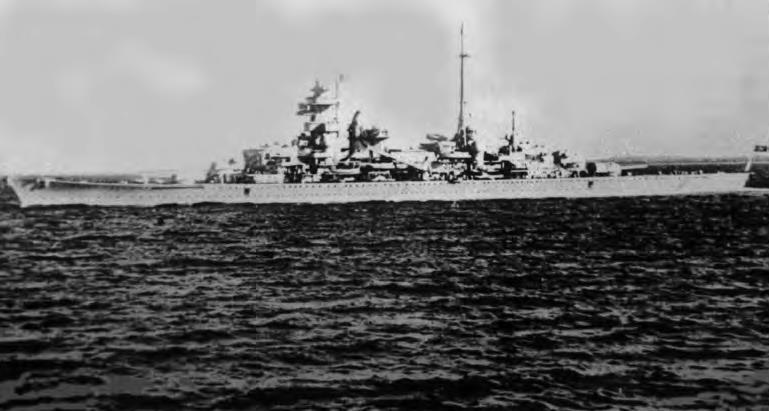
It seems that the built-in admiral's bridge is in place in this photo. This means that we see Blücher, probably during an exercise, in late winter 1940. PHOTO: From the book "Blücher" by John. H. Østby. Courtesy of Ove Andre Østby and Wera Forlag.
there, must be completed in just a few weeks. Despite the high level of activity, there is not enough time for exercises with live ammunition. Not a single shot is fired.
On 5 April, things start to happen that make several members of the crew sit up and take notice. Just before 18:00, the Blücher enters Stranderbukten (9) at low speed. Here, Rear Admiral Oskar Otto Kummetz (10) comes on board. Kummetz is a small, sinewy man with a weather-beaten face. He has previously been chief of staff in the fleet management. From the top of the aft mast, the white Rear Admiral's flag now flies with the two black balls closest to the flag line.
A searchlight exercise is carried out, which ends at 02:00, together with the school cruiser Emden (11). Emden settles in the wake of Blücher and follows the cruiser on an easterly course. "Now we're heading towards the enemy," say some sailors without confirming their speculations.
To the surprise of the crew, the Blücher sails into Swinemünde harbour on the island of Usedom (12). As they pass the long pier, the ship's orchestra goes up on deck and plays. They are amazed to see a number of cargo and passenger ships. Armoured guns, tanks and trucks are placed on the decks. The deck cargo is clearly secured for sea transport. Everywhere, soldiers from all branches of the armed forces are swarming. Something is happening. Something is in the air.
The uneven droning from the engine room tells Willi that something is going on. The Blücher is clearly entering an area of very low speed. Are they approaching a harbour? Are they passing a narrow strait? Willi is off duty and sits in the cabin until the bulkhead where the porthole over his head is properly closed according to the situation they are in.
He is sitting at the end of the long table. A little further along, three men are asleep in their hammocks. In front of him on the table is a pencil and his diary. Willi has been writing and drawing in his diary since he joined the army. It is in this book that he writes down his experiences and innermost thoughts. In the same book he writes love letters. He writes to Elfriede:
"My dear Elfriede.
To fulfil my promise to you and to show that I haven't forgotten your address, I'm writing this letter. At the very beginning, I have a question: Where have you been the last few days? Had I
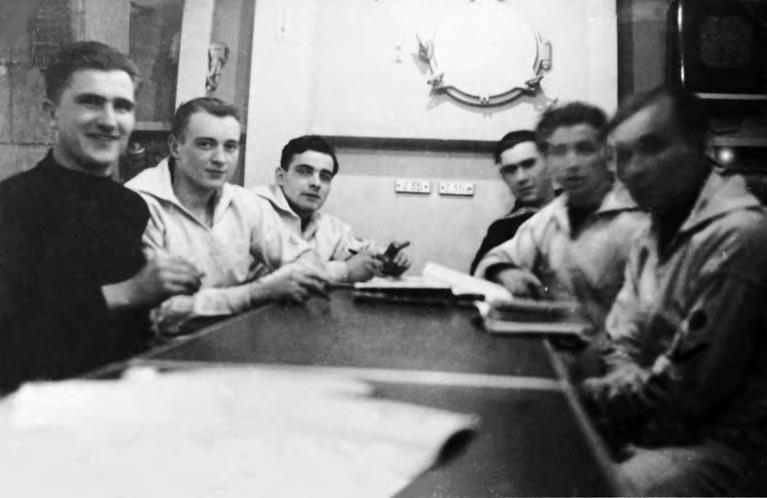
At the end of the table in the cabin, Willi sat and wrote love letters to several
From the book "Blücher" by John. H. Østby. Courtesy of
The last time we met, I wanted to show you how loving and kind seafarers can be by asking your permission to walk you home. I have it on good authority that you don't like Muscha at all and that you cried at the maistanga. Dear Elfi. For once in your life, be honest. Who do you like more? Muscha or me? At least I thought I could tell that I wasn't completely insignificant in your life.
That night I had a romantic dream. I saw both of us sitting in the Kafe "Reichs-halle". We were joking and laughing. Floating over the parquet, we kissed each other. When I woke up, I didn't know if I was still on holiday or on board the ship.
When we met for the first time, I knew immediately that you were the right girl for me. We connected so well. I can still picture people staring at us when we were dancing. Now I have to finish."
Satisfied, he puts down his pencil and thoughtfully flips back through his diary. A new letter that has never been posted appears. A letter he wrote several months ago. With a small smile on his face, he begins to read the letter to another woman. The letter to Lotte:
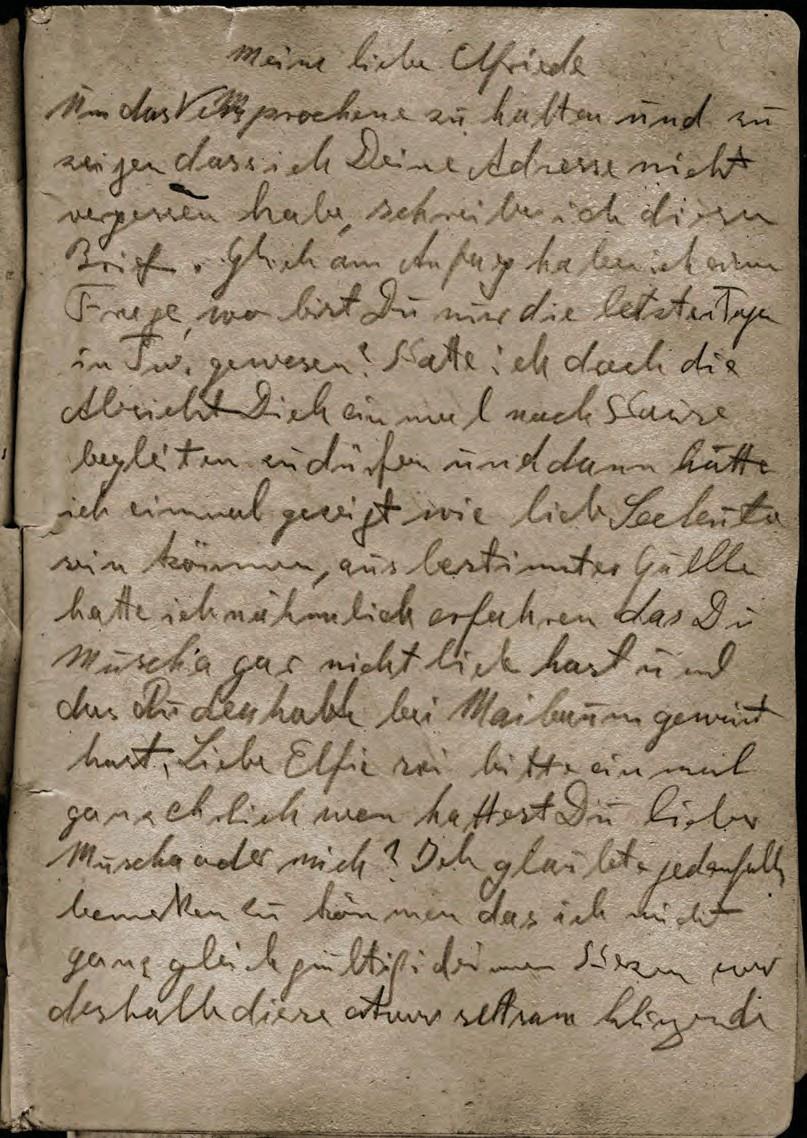
"My beloved Lotte. Finally, I have the opportunity to give a sign of life. It has been impossible so far. You'll realise that when you've read the whole letter. To summarise: I had promised to come to New Year's Eve, but everything turned out differently than we had agreed. After celebrating Christmas Eve at sea, I had the opportunity to travel home for eight days. I left Kiel on 29 December. It was a Friday. After arriving home safely, I spent Saturday and Sunday morning with my family.
"Just after lunch I went to the station to travel to you, but was stopped by the military police. They refused to allow me to travel on the grounds that in war you can't leave the place you're in. I was incredibly disappointed. After a long year, I finally had the opportunity to hold you in my arms. "An accident rarely comes alone," says an old saying, and this time it was true. Early Monday morning, I received a telegram telling me that my holiday was cancelled. I was told to leave immediately. In Kiel, when I came on board, we were already ready to sail. I wasn't allowed to say where we were going. In my first off-duty period on board, I wrote this letter. I'm going to hand it in at the next harbour we come to. I don't know when you'll get it."
This letter was written several months ago, but things have been so hectic on board that Willi has not had time to post it. (Note: It seems that Willi intended to tear/cut out the pages of letters from the diary). "I wonder when I'll get these letters posted?" He takes the diary and presses it to his chest. Calmly, he gets up and walks carefully towards the cupboard. He doesn't want to wake the sleeping boys. The cupboard door makes a small creaking sound as he opens it. Carefully, he fumbles for the shipping bag, which is already packed. There's one thing he's learnt from the other boys. If for some reason he has to leave the ship in a hurry, he will try to take the ship's bag with him. It's packed with everything he needs to get by for a while. Among other things, he has packed several changes of work uniform. "There are many people on board who have done this.
Carefully, he lifts up the top layers of laundry and gently places the diary between them. He doesn't want anyone to find the diary if the cupboard door is left unlocked for some reason. He also wants to have the diary with him in case he needs to take the carrier bag with him quickly. Willi looks at his watch. There's an hour left of his free time. He has time to catch a little shut-eye.
With the help of a pilot and four tugs, the Blücher is moored at Eichstaden (13) just before 13:00. Immediately afterwards, a conference is held on the Blücher with the transport officer from the army and the second-in-command from Emden. It concerns the entry of
The shipment of troops from the 163. Infantry Division. They also discuss the transfer of weapons and other equipment to the vessel. Shortly after the meeting, the order comes echoing through the public address system: "Ready ship. Landing ban". This is followed by: "Make preparations to receive troops from the Army who will come on board during the night". At 18:00, the three torpedo boats Möwe, Albatros and Kondor (14) have also left behind Blücher and Emden at Eichstaden.
The army soldiers are coming
In the evening, Admiral Kummetz personally informs the commanders of the naval and army units involved about the planned action. The time passes 19:00. It has begun to twilight. When darkness falls, there is a lot of activity in the harbour. Before long, the harbour is packed with infantrymen with guns, machine guns and ammunition boxes. From Swinemünde railway station, long lines of soldiers come marching. They have arrived by freight train.
The second-in-command of the Blücher, Fregattenkapitän Erich Heymann, and the second-in-command of the Emden, Kapitän zur See Wolfgang Loeper, stand at the gangway with long lists. Directly behind them, several sailors wait in the light of a blinding lantern. Before the soldiers enter the ship, they are all given instructions on how to behave on board. The soldiers are shown where to sleep. It is clear who is seaworthy and who is not. The army men stumble through narrow corridors and hatches. With their iron-shod boots, they slip on the unfamiliar surface. Because space is at a premium, the men crowd together in the living quarters. It's almost impossible to move around in there. Younger officers have to leave their cabins to the guests. Over the course of the night, a total of around 800 men with full equipment from the army are taken on board. The Air Force is also represented by a staff consisting of a few men. The weight of the equipment and ammunition is approximately 31 tonnes. Because there is no more room in the Blücher's ammunition compartments, the army's ammunition has to be stowed under the armoured deck. Four anti-tank guns with all their accessories, machine guns, hand grenades and rifle ammunition, were placed on the upper deck and by the torpedo batteries.
A new order sounds through the public address system on board the Blücher: "No one belonging to the army troops may be seen on deck. Those who want to get some fresh air must borrow a hat, a blue jacket or a long coat from the crew on board. No one wearing field grey uniforms is allowed on deck."
At 06:00 on Sunday 7 April, Blücher and Emden set sail from the port of Swinemünde. The torpedo boats Møwe, Albatros and Kondor follow close behind. They sail out of sight of the harbour. expanse from land. First in a large arc to the east. Then with a
westerly course towards Kiel to Stranderbukten.
It's 8 April and the time is 03:00. Willi, Richard and Fritz notice that there is abnormal activity on the bridge. It is just over 24 hours since 800 soldiers from the army came on board. They have been sailing under the order "Ready ship" since their departure from Swinemünde. Blücher makes a short trip to Stranderbukten. There, the three boys are told to be ready at short notice. What they don't realise is that the commanders from the other vessels have come on board. They are staying in the admiral's cabin. There, they review classified operational plans. Admiral Kummetz reviews the plans one last time with the help of large overview maps. The action "Occupation of the Oslofjord" starts now.
The order "Ready ship for battle" is given. Willi looks over at Fritz. "I wonder where we're going now?" Fritz shrugs and replies: "God knows. Now we've been given the strict order, so that must mean we're going into battle, but I have no idea where." There's a double crew in the engine rooms now. The noise from the powerful machine makes it difficult to hold a conversation. The engineers have more than enough to do. Manual adjustments have to be made all the time. Watchful eyes have to make sure that everything is working properly.
"Working at the bottom of a large ship is often a mental strain. "The guys down here see nothing of what's happening outside. They only receive orders to change speed. The speed must be manually lowered or increased. It has to happen gradually. At the same time, the cooling water must be adjusted. This is also done manually. If the vessel is fired upon, torpedoed, collides, runs aground or suffers other damage that threatens its buoyancy, the engineers are often the last to be allowed to leave their posts. Without them, the bridge loses control of the vessel. The fact that they are least able to get out on deck within a reasonable time means that they have poor odds when such situations arise. This may explain why it was customary to have the ship's bag packed at all times.
The hours go by. So far, they have maintained a steady speed. The noise from the machine spreads throughout the vessel like a steady drone. Willi sees Richard over by the oil gauge. It's so loud that it's impossible to call out to him. He can see that Richard looks tired. "I can understand that," thinks Willi. "I'm pretty stubborn myself." He walks towards Richard.
Richard Fleck, Willi Schlüricke and Fritz Hilgemann
to ask how he is doing, when he is told to slow down. Willi små- runs back towards his post. He is responsible for adjusting the cooling water. The roar of the powerful machine changes. There is a little less noise. The revs are low. We have almost stopped. The cooling water is corrected and Willi looks round. The others stand waiting at their posts. Everyone is waiting for the next order. Should the vessel come to a complete stop?
Now they are being told to keep up the pace. Several deployment tests will be carried out with the troops from the Norwegian Army to practise shipping in the Oslofjord. While the vessels are lying like this, one or more periscopes may appear at any time. Submarine scouts are deployed on all the vessels. During these exercises, it is the torpedo boats that have the main responsibility for scouting for submarines and other vessels. The exercises are completed, the army soldiers go back below deck and the vessels speed up again.
The alarm goes off
At 13:05, the heavy cruiser passes the Danish island of Anholt (15) in the Kattegat. It cuts through the sea at a steady, good speed, closely followed by the other vessels. Fritz and one of the other lighthouse keepers go on leave. A few hours of longawaited sleep lie ahead of them. Richard looks longingly at Fritz. His body language reveals that he is missing his hammock. At 5.15pm the group is level with the small island of Hirtsholm (16) off Fredrikshavn (17). They are approaching Skagen. The swells are getting heavier. Tension rises on board. They will soon be out in the open waters of the Skagerrak. The possibility of encountering British submarines increases. The heightened level of tension covers the entire vessel like a lid. Kapitän zur See Heinrich Woldag (18) stands on the bridge. The captain picks up a pair of binoculars and looks calmly out to sea. It's quiet up on the bridge. You can barely hear the monotone droning from machine. Suddenly the alarm goes off! From the bridge it is shouted: "Emden has hoisted
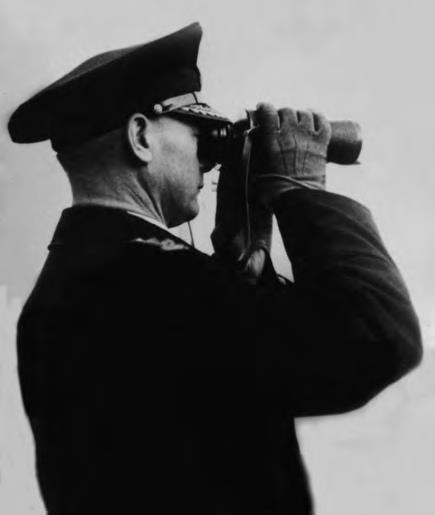
the signal flag. Submarine danger! Alert!
Enemy submarine in underwater position on starboard side. Fire!" The alarm bells ring. The volunteer guards rush up through hatches in the bulkheads and up ladders. Everyone takes their places in a minimum of time. Guns and air defences are manned. Willi realises that things are happening on the outside. The order: "Full speed ahead", is given. Through the noise of the engine, he hears the dull, jolting sound of the guns firing on board. His pulse quickens. He looks over at Richard. Their eyes meet. It's not hard to see that this situation is frightening for both of them. Abruptly, the voice of the Blücher's commander cuts through the noise of the alarm bells and gunfire. "Cease firing." There are a few seconds of confusion. What is happening? Calmly, Woldag grabs the microphone and says: "The periscope is an innocent sea mark". A liberating laugh erupts on the bridge. Downstairs in the engine room, both Richard and Willi drop to the floor. Both of them are completely exhausted from the nervous pressure. It goes without saying that a torpedo attack with one or more direct hits would probably mean the end for the engineers. They would never be able to get up in time.
A short time later, the submarine alarm goes off again. Once again, full engine power is given from the engine rooms. The men can clearly feel how the vessel lurches every time it changes direction to avoid being hit by the submarine's torpedoes. The roar and shaking of the guns can be felt throughout the heavy cruiser. The motor torpedo boats release synchro mines and the alarm bells chime furiously. Down in the engine rooms, the same thing is happening as last time. The fear that a torpedo could come through the bulkhead at any second almost paralyses the guys down there. Richard performs his tasks completely mechanically. He is incapable of thinking sensibly. Fritz says a prayer as he does what he has to do. He doesn't see any of the other engineers. He is in his own little bubble with a desperate desire to survive. Willi feels the nausea being thrown at him. He also has a mechanical focus on his tasks. When the alarm is cancelled, he runs to the nearest sink and vomits. Tears roll uncontrollably. He is so glad he survived.
Blücher continues northwards. A little before 22:30, the vessel passes Færder and Tor-Bjørnskjær lighthouse. Down in the machine, everything is stable. The watch goes on as usual. In an hour and a half there is a change of watch. Willi is looking forward to getting some sleep. He sincerely hopes that the off-duty shift will pass without the alarm going off.
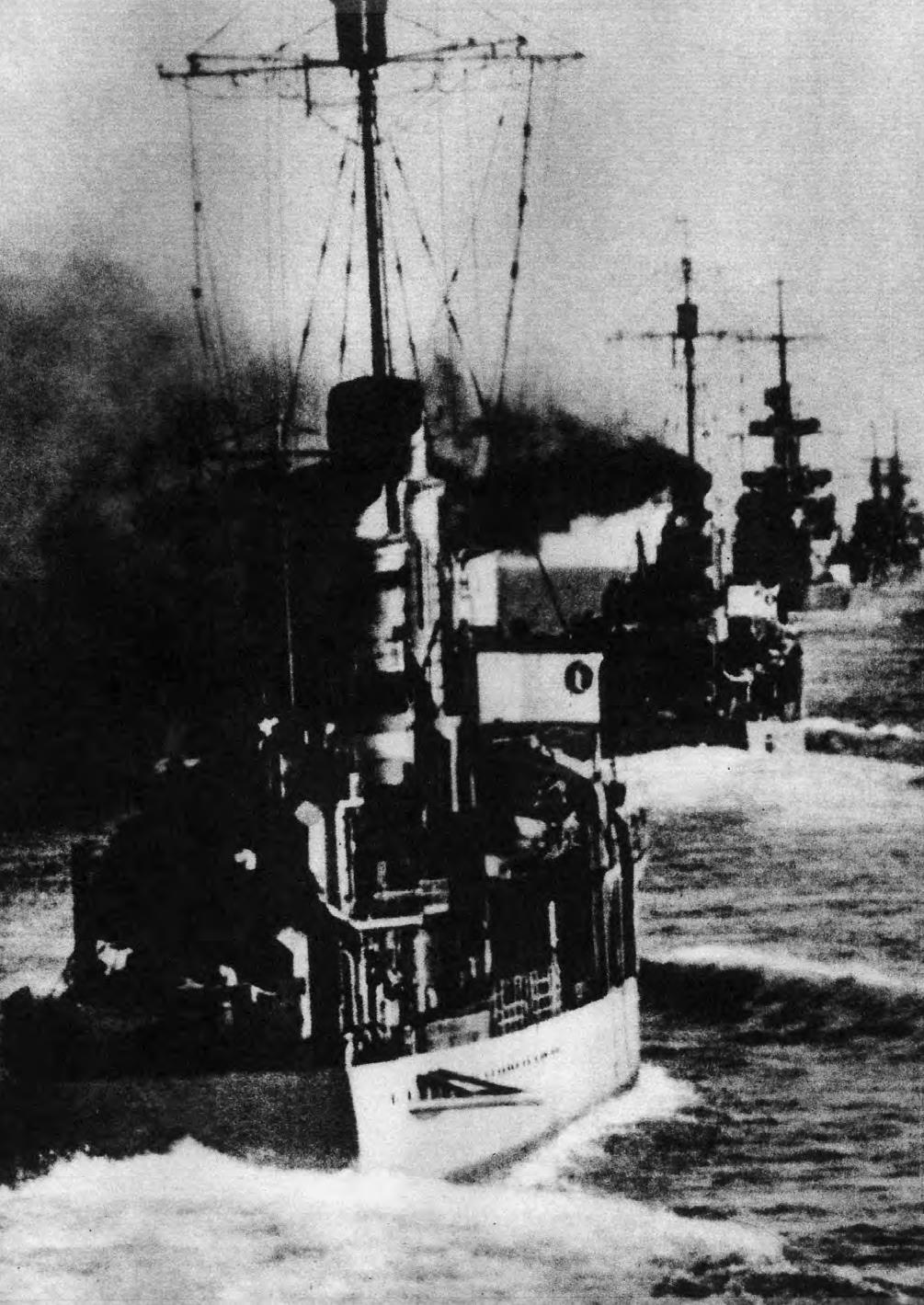
The Kriegsmarine squadron in rapid formation, as Assault Group 5 sailed into Oslo@orden on 9 April 1940, with extinguished lanterns and no flags on the mastheads.
PHOTO: From the book "Blücher" by John. H. Østby. Courtesy of Ove Andre Østby and Wera Forlag.
An hour later, all the lighthouses in the outer Oslofjord are extinguished. On the bridge, the crew realises that the Norwegians have become suspicious. Something is afoot. With no lights to orientate themselves by, the helmsmen and the commander are put to the test. Vigilance increases. There is tension in the air. The voyage through the fjord becomes more difficult and therefore more dangerous. Slowly and tentatively, the vessels sail on into the night. At 24:00 they pass Bolærne. There are only 55 nautical miles left to Oslo.
Richard and Willi crawl into their hammocks, exhausted. "I hope it's going to be a few quiet hours," says Willi as he finds a good sleeping position. "Yes, I can't take it anymore," Richard replies quietly. There is silence. Half asleep, Willi realises that the steady engine noise has suddenly stopped. What's happening? "Richard!" Willi tries to make contact, but Richard is already in a deep sleep. His heart rate is increasing. "Surely the alarm will go off again?", Willi thinks as he looks out into the pitch-black cabin. The clock is ticking. He feels the tiredness creeping over him again. It's just before he dozes off when he clearly hears heavy gunfire. The shots are not coming from the Blücher. Willi jolts awake again. His pulse rises again and he is sweating. Uncertainty gnaws at him. Surely the alarm will go off any minute now? Nothing happens. The machine speeds up again and then stops. The minutes tick away. Finally, Willi falls asleep completely exhausted.
What Willi hears is the encounter with the Norwegian guard boat Pol III (19). The captain on board, Leif Welding Olsen (20), sends mother signals to Blücher. He asks about their nationality. The answer he gets is that the torpedo boat Albatros is trying to sink them. The collision is violent. The vessels are left drifting in the calm sea. Out of the darkness, Captain Welding Olsen's voice is heard through a public address system. In German he says: "Surrender your vessel or I will shoot!" Several of the surrounding vessels now have their lights switched on.
Pol III is bathed in light, and it is not difficult to see that the vessel has aimed two 10.5 cm guns at Albatros. Immediately afterwards there is a bang. Albatros has fired all three anti-aircraft guns. One shell destroys the radio on Pol III. Another hits the bridge, and the third starts a fire below deck. Despite the damage, Pol III continues to fire back with what they have. On board the Albatros, they see a Norwegian standing on a ladder in an attempt to repair the radio. Commander Strelow (21) gives another order to fire. It breaks loose. The result is ugly. On board Pol III there are now many casualties, including Captain Welding Olsen. His injuries are lifethreatening and he becomes the first Norwegian to be killed in the war. The rest of the crew are taken
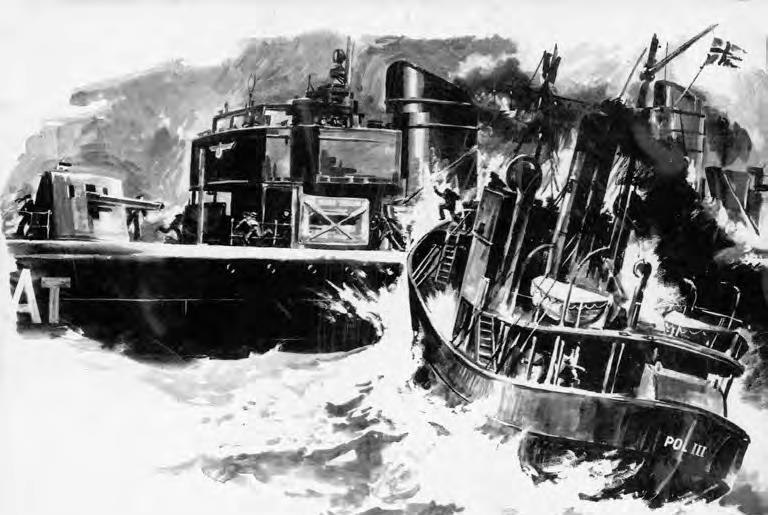
The Albatros tries to sink the Pol III. The collision is powerful. PHOTO: From the book "Blücher" by John. H. Østby/Andreas Hauge (illustrator). Courtesy of Ove Andre Østby and Wera Forlag.
on board the Albatros as prisoners. There are 15 men. The entire operation against the guard boat has lasted an hour and a half. At 01:32, Admiral Kummetz is informed by radiotelephone that the operation has been completed.
Willi
Willi is jolted awake by a loud crash. The entire vessel shakes. The alarm goes off. In the darkness, he jumps out of the hammock and screams: "Richard!" He swears and switches on the light. Now Ric-hard comes to life too. "What the hell is going on?" Richard gets no answer. Willi is already out of the cabin. He runs
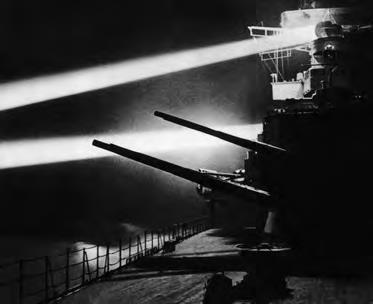
Pole III is bathed in light. Immediately afterwards there is a bang. Albatros has fired all three anti-aircraft guns.
PHOTO: From the book "Blücher" by John. H. Østby. Courtesy of Ove Andre Østby and Wera Forlag.
towards the engine room. Suddenly there's another bang! Willi is thrown into the bulkhead. His breath is knocked out of him for a moment. The furious sound of the alarm bells cuts through the darkened corridor. In the chaos that ensues, screams and swear words are heard. There is clearly complete confusion on board. Willi crawls on. People run past him. He is stepped on by several army soldiers who make their way up to the deck. They are in complete panic. Willi scrambles to his feet and tries to get to the machine.
Mr Richard
Richard wakes up to a thunderous crash. He can feel the vibrations in the vessel. Almost in shock, he rolls out of the hammock. It's pitch black around him. Suddenly he hears Willis' voice: "Richard!" The light is switched on. Richard answers. He wonders what's going on? He gets no answer. Stunned, Richard looks around. Willi is gone! There are screams and confusion in the corridor. Richard is about to leave the cabin when there is another bang. The whole ship shakes, and he is thrown into the cabin. The intense sound of the alarm bells causes Richard to tremble. His whole body shakes uncontrollably. Out in the corridor, soldiers run across the room. Panic spreads. Richard gets up and staggers out of the cabin. He must get to the engine rooms.
Fritz is in the process of levelling one of the fuel tanks. There has been a lot to do on this shift. He glances at his watch. It reads 04:17. Fritz notes with satisfaction that the level in the tank is as expected. He sits down on the floor. His body is tired after a long shift. The steady, loud noise from the machine is soporific. It's warm and fortunately it's not long before the shift change. It will be good to get some sleep. Suddenly the whole ship shakes. At the same time, a sharp bang is heard. Fritz jumps up.
What was that? The piercing sound of the alarm bells is clearly audible, despite the noise of the machine. The noise in the engine room means he can't hear what's happening in the corridors. One of the other firemen comes up to him and roars: "What was that? What's going on?" Fritz shakes his head. "I don't know. I think ..." Before he can finish his sentence, there's another bang. This time it feels more powerful. Both men are thrown to the floor. Terrified, they scramble back to their feet. What are they going to do?
The engineers are ordered to go full speed ahead. There is uncertainty and confusion down in the engine rooms. What is happening above their heads? The communication lines from the bridge are broken. Now, with the help of a shouter, an order is given for two stokers to enter the helm engine. The rudder has locked in
Richard Fleck, Willi Schlüricke and Fritz Hilgemann
the port position, so they need to get it sorted. There is extensive damage to the vessel. There are seriously injured and dead soldiers on the bridge, on the deck and down the stairs leading to the interior of the Blücher. There is also a heavy fire amidships in the aircraft hangar. The two hits came from Oscarsborg Fortress (22).
The commander of Oscarsborg Fortress, Colonel Birger Eriksen (23), is the man who gives the order to fire on Blücher. He receives a message from the guard boats Alpha and Kranfartøy 2, which are patrolling the fjord south of Filtvet. They report that the enemy vessels are approaching. As early as 23:15, Colonel Eriksen begins to prepare. He has received information from, among others, the 1st Naval Defence District that Rauøy and Bolærne are in battle against foreign warships. All fires have been extinguished.
Ammunition is hoisted to the two cannons Moses and Aaron (24). The third gun, Joshua, is not manned. Colonel Eriksen does not have enough men. Moreover, the men he has are untrained. With a gun crew of 23 men plus 10 men in the ammunition chambers, the colonel makes the final preparations. He is unsure of the nationality of the approaching warships. What he has realised is that these are foreign naval forces entering Norwegian waters as uninvited guests.
At 4am, the crews at Oscarsborg Fortress hear the engine noise from the enemy vessels. The engine noise breaks the otherwise quiet spring morning. A few minutes later, they recognise the outlines of Blücher. Now messages are coming in from the guard boats. German warships are entering the fjord. When Blücher is about 1,800 metres from Oscarsborg, the colonel gives the order to fire. The time is now 04:21. The cannon Aron sends off the first shot. Shortly afterwards, Moses sends the 345kilogram grenade from 1934 hurtling through the air, hitting Blücher with great force. The defence of Norway is underway!
Blücher is now just below Søndre Kaholmen. Both Willi and Ricard have made it to the machine. They are immediately ordered to man their stations. Due to problems with the rudder, they have to right the ship using the side propellers. The centre propeller is out of order. Orders are given. The engineers are working flat out. They must manage to gain control of the vessel. The commander has asked for "full speed ahead". Slowly the speed increases to 15 knots. While this is happening, they notice that there is shooting on the outside. It is unclear who is shooting at what. The smell of smoke has gradually spread to several engine rooms. Against the dim light in the ceiling, Fritz can see a thin veil of smoke. "There must be a fire somewhere," he thinks without worrying too much about it. Someone must have it under control.
On the outside, there is a heavy fire behind the bridge, which has been badly damaged. The Kopåsbatte- riet (25) on the Drøbak side receives 20 hits from a distance of 600 metres. Blücher is in big trouble.
As the Blücher passes Nordre Kaholmen, two torpedoes are fired from the hidden torpedo installation inside the rock on the island. They are launched almost simultaneously. The first one probably hits boiler room 1. Seconds later, the next torpedo slams into turbine room 2/3. Both torpedoes hit vulnerable parts of the engine rooms. Seawater gushes in. The ship tilts, and eventually begins to list heavily to port. The engineers work feverishly to stop the ingress of water and to start the centre propeller engine. A few minutes later, the machines for the side propellers also stop. It is now no longer possible to steer the 208 metre long vessel. There is a massive fire on board, and ammunition stored almost everywhere explodes several times. As a result, several people are injured and some are killed. At the same time, the vessel suffered further damage as a result of the fires and powerful explosions. Heinrich Woldag, the commander on board, decides to let go of the stern anchor. He does not want to run the heavy cruiser aground because the chief engineer has reported that it should be possible to restart the side engines. "The stern anchor is stuck. It has become wedged due to the cruiser's list. The starboard anchor is dropped successfully. It settles at a depth of around 60 metres. At the other end of the 175-metre-long anchor chain is the Blücher with an ever-increasing list.
Fritz is fighting for his life
A deafening crash, followed by a tremendous force, sends Fritz headlong towards a ladder leading up from the engine room he is in. Fritz wakes up to find himself lying on the floor, ice-cold seawater running down his body. Stunned, he tries to get up. He has to feel his way around. The room is completely dark. Fritz hears large amounts of seawater running into the room he is in. Dazed but determined, he crawls up the ladder and up the hatch above him. Screams and shouts are heard all around. Fritz fights his way further up the vessel. He realises that the Blücher is starting to list. This makes it even more difficult to move. The smell of smoke has become much stronger now, and Fritz is breathing heavily. The smoke is getting thicker. He coughs and gasps for breath. Now he tastes blood. From the moment he woke up in one of the engine rooms until now, Fritz hasn't noticed anything other than the smell of smoke and the prevailing panic. Now he runs his right hand over his face. He feels that his lips are swollen and bloody. Automatically, he lets his tongue moisten his lips. Then he realises that everyone
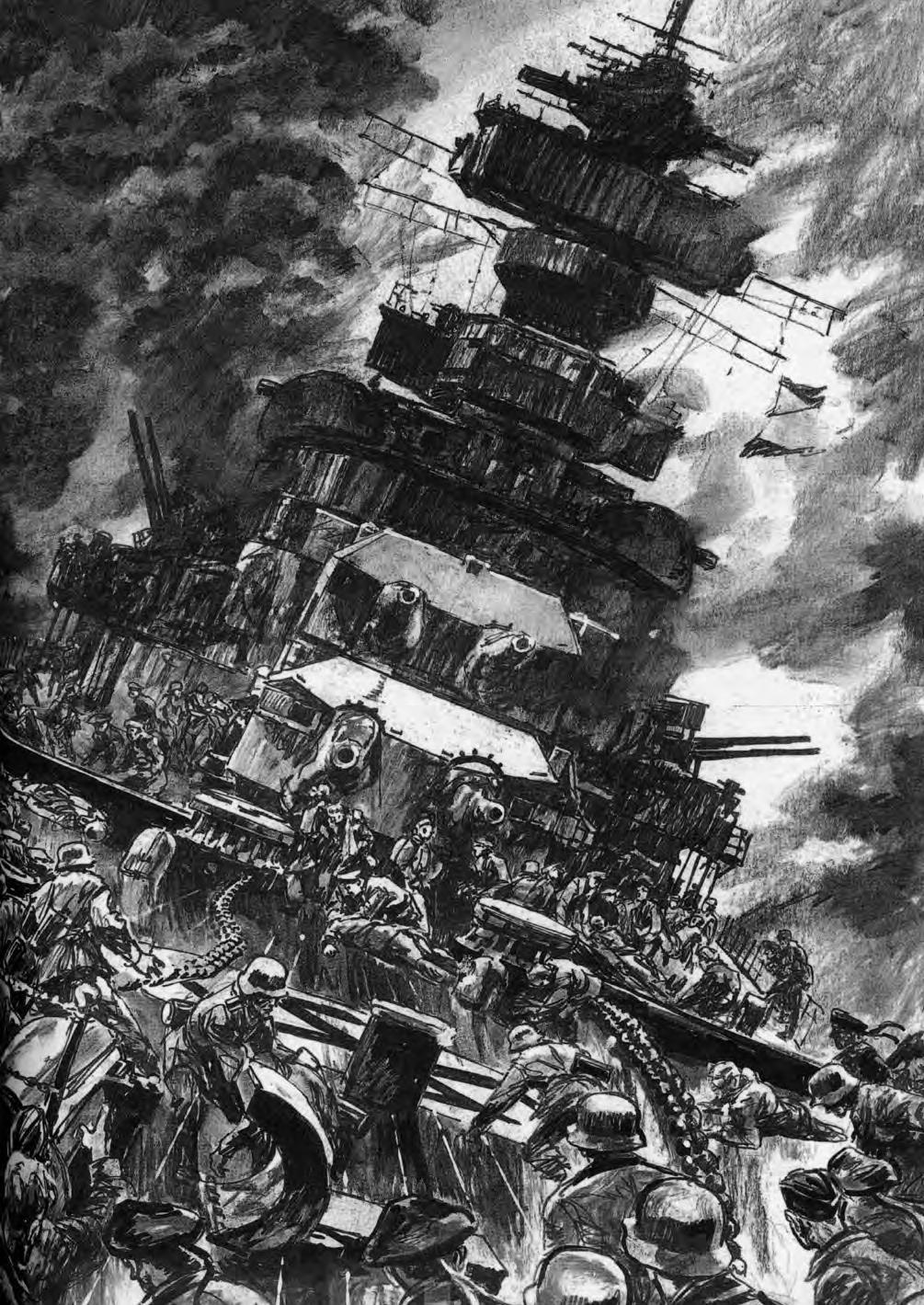
Screams and shouts are heard all around. Fritz fights his way further up the vessel. He realises that the Blücher is starting to list.
the front teeth in the upper mouth are gone! Oh dear! He lets his tongue search from canine to canine without finding any teeth in between. The pain from his teeth is telling. Determined, he continues his journey. He is heading towards dense, black smoke mixed with cold spring air. It's early in the morning on 9 April.
Richard crabs to the open air
Richard is one of the people working on the defective rudder machine. "It looks like the rudder is wedged. The motor is working, but it can't move the rudder. Could it be one of the power transmissions that is broken? Over their heads, shots are clearly heard. The sharp bangs reveal that they are being shot at. Heavy thunderclaps tell the engineers that the gun crew is busy. "Where the hell are we?" thinks Richard. Eventually, he begins to experience a high pulse rate and the painful lump deep in his stomach. It's the physical manifestation of uncertainty, fear and anxiety. It's only been a few minutes since he was asleep. Now all hell is breaking loose again!
Richard feels the fear taking hold of his body. Memories of the torpedo boat Tiger come flooding back. It's painful. Suddenly there's a bang! Richard jumps out of his skin! He feels the panic spreading through his body as he heads out the door to the corridor. Richard is on the opposite side of the machine rooms to where the torpedo hit is. As he puts one leg down on the floor in the corridor, there is another explosion. This time considerably more powerful. Richard is blown down the corridor. Halfunconscious, he rolls a few metres down the narrow, dark corridor. Luckily, the journey stops before he is seriously injured. In the darkness, he crawls to his feet. Relieved that he is relatively unharmed, he searches for the ladder up to the deck. All around him there is panic. Screams, swearing and fear fill the dark corridor. Richard staggers on. In the darkness he stumbles and falls. He swears and gropes around when his hand hits something soft. What is it? With both hands he feels what it is. It's a body. Several crew members fight their way past. They step on the body lying there without realising what it is. The struggle for survival has begun in earnest. Richard gets up unsteadily and moves on. Where is the ladder?
Now he realises all the smoke in the corridor. He has to get out of here! One of his hands searches along the bulkhead. The Leider should be here! Flustered, Richard realises that the leader is gone! Something must have happened when the last torpedo hit the side of the ship. There's another leider on the other side of the corridor. He lashes out as he leans against
Richard Fleck, Willi Schlüricke and Fritz Hilgemann
one bulkhead. Has the cruiser got a list? Fear takes hold of him again. Richard starts to run. He stumbles and crawls on. Other crews around him shout for help. Some can't find their way up. Others are crying loudly. Richard knows he is approaching the second ladder. In the darkness, he realises that there are more bodies on the floor. He doesn't care. He stumbles forwards. In front of him, a group of terrified boys appear. They are waiting for their turn to climb up the ladder . Richard waits impatiently for his turn. Imagine if it goes off again! The lump in his stomach grows. There it is! Now it's his turn. With quick strokes he climbs upwards. After four or five steps, he bumps into the legs of the boy above. More queue. It's a shame they can't move on! Richard shouts in despair: "Move on! Move the fuck on!"
At long last! Now there's movement in the queue. Richard climbs on. Up one deck, finds the next unfortunately and crawls on. Another queue. Once again he has to wait. Now he clearly notices that the vessel has got a list. The queue moves again, and minutes later he feels the cool sea air hitting him. He's soon up on deck!
Willi has sneaked out of the engine room to change his uniform. When Blücher was fired on from Oscarsborg, Willi fought his way towards the engine rooms. In a situation like this, Willi's job is to show up at his post. From there he would receive further orders. As Willi enters the door to one of the engine rooms, he slips and rolls around on the floor. The entire floor is covered in oil. The shaking of the ship after the second direct hit had knocked over a large open oil drum that was to be used to top up one of the auxiliary engines. Willi is completely covered in oil. He quickly realises that he cannot continue working in this uniform. He looks round. There are no officers here. Only a couple of other firemen are standing with their backs turned, clearly busy with something. In the noise, they have not realised that Willi has arrived. He goes back. Soldiers run past in the dark. The piercing sound of the alarm bells still fills the darkened corridor. He wriggles out of his soiled work uniform and hurries on towards his own cabin. Wearing only his underpants, he strides into the cabin and switches on the light. To his great surprise, it works. He has hidden the key to the locker in a crack on the top of the locker. He unlocks the door, quickly tears off his oily underpants and retrieves a new pair from the locker. A few seconds later, he's ready to lock the locker. He smells of oil, but that's okay. It's good to put on clean and dry clothes.
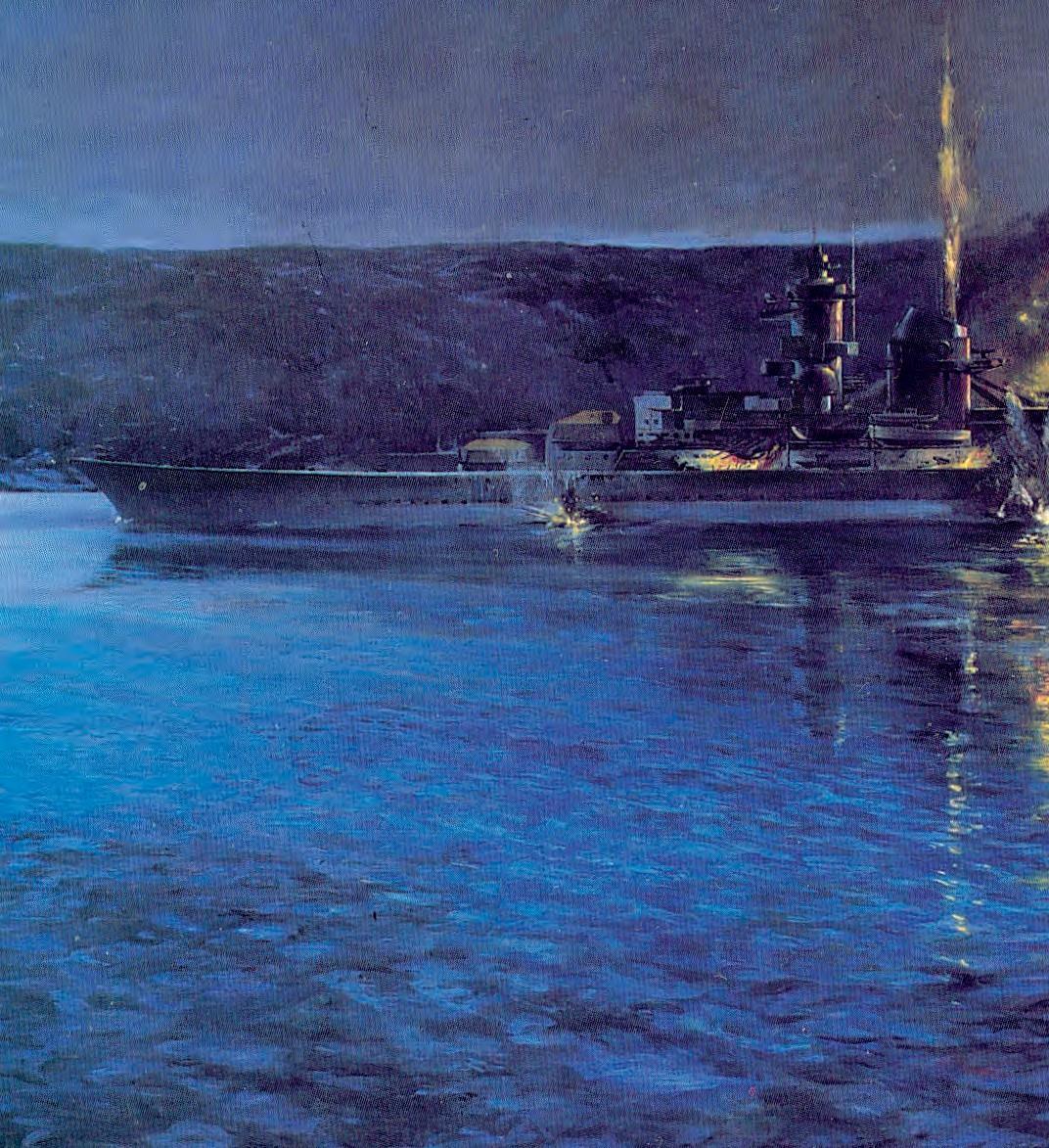
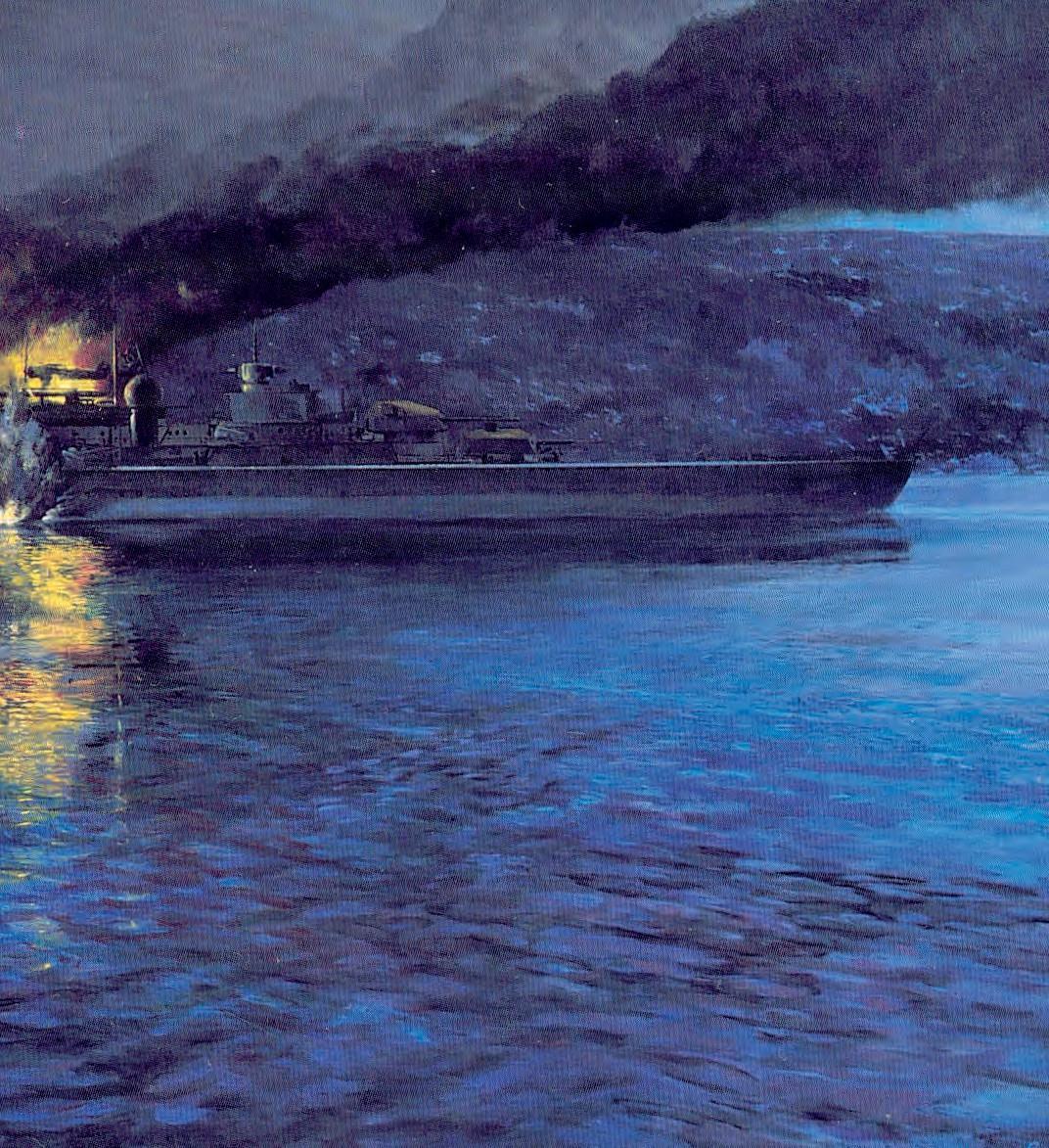
The second torpedo hits the target. Blücher has been dealt the death blow.
PHOTO: John H. Østby/Reidar Finsrud (painter). From the book "Blücher" by John. H. Østby.
Courtesy of Ove Andre Østby and Wera Forlag.
As Willi closes the cupboard door and turns the key, the whole room is filled with a deafening roar. Willi is thrown like a rag doll over several of the hammocks before hitting the floor hard. He lies in a faint for a few seconds before his eyes glaze over. The cabin is in complete darkness. Stunned, he stands up and feels a sharp pain in his left leg. At the same moment, there is another loud bang. It is clear that the explosion is not so close now. Willi feels that the entire vessel is shaking. Terrified, he starts to move towards the door in the cabin. He collapses. His left leg is unable to support him. He grimaces and tries to get up. He has to get out of here!
In the corridor, alarm bells are ringing furiously. Terrified young men dressed in impersonal, identical uniforms are running around, removing the people and turning them into servants. Now it is the humans who are fighting for survival. In the darkness, he glimpses the terrified faces rushing past. The army men each have a small lantern attached to the chest of their uniforms. That way, they have both hands free and can move faster. The weak, thin beams of light flicker back and forth every time an army soldier passes. In pitch darkness, Willi is dazzled every time a beam of light hits him.
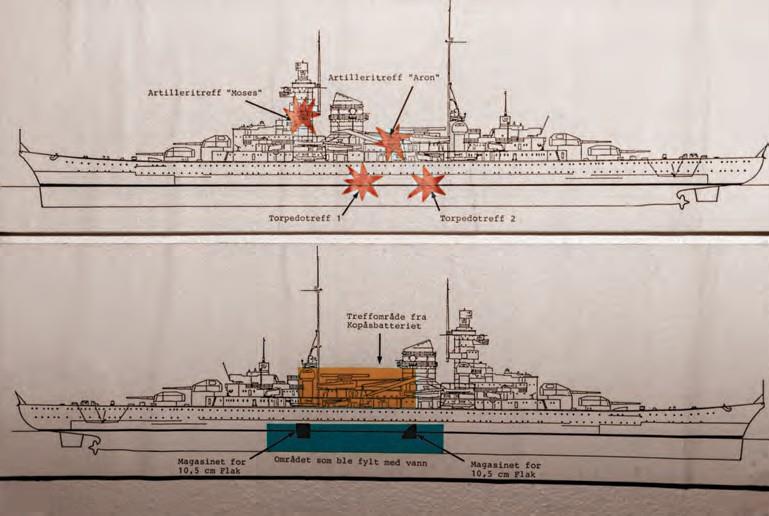
him in the face. He can feel the anxiety taking hold of his body. The pain in his leg stabs him every time he tries to put weight on it. As he claws with his right hand at a pipe that runs along the ceiling, he lets his left hand stroke down his aching leg. Ahhhh! The fingers stop at the knee. That's where it hurts the most. In the dark, he loosens his trousers and lets his hand follow the thigh down to the knee, right up to the skin. He has to feel if there is a lot of blood there. It's impossible to see anything in the dark. Satisfied, he realises that there is no blood under the trousers. Willi ties the waistband of his uniform trousers again. The screams in the corridor tell him that there are several injured and probably many dead fellow soldiers. As he is about to limp out into the corridor, he remembers the duffel bag that is packed in the cupboard. It contains the most important things. Willi limps back again. The pain cuts through his body. Damn it! He pulls the stuffed duffel bag out of the cupboard.
Outside the cabin there is less shouting and screaming now, but the piercing, steady alarm bell continues to ring. Willi moves out into the corridor. He partially waddles across the floor with the ship's bag in tow. Now he becomes aware of the ice-cold water flowing in torrents. He realises more and more that this is a very critical situation.
The way up
There are hardly any people left in the ship's interior. Those who could, have made it out. What was that? In the darkness, he feels that his hand has hit something soft and round. Has someone lost their rucksack here in all the chaos? Willi lets his hands follow the shape of the "ship's sack". It becomes narrower downwards. Suddenly Willi feels a hard edge. Seconds later, he realises what he's feeling. It's a severed leg, with the boot on. Nausea strikes him. He lets go of what he's holding in his hands and turns away. A moment later he vomits.
He works feverishly towards the ladder that leads up to fresh air. Drenched, shivering and half in panic, Willi pulls himself up the ladder while pushing the ship's bag in front of him. Now he also realises that the large cruiser is listing. Slowly but surely, he works his way upwards. Step by step.
Tears roll down his cheeks. He doesn't know why. With every movement he makes, almost his entire body is paralysed by the pain from his left knee. He tries to ignore it, even as he feels the air getting colder. Willi approaches the deck.
Out on deck, the black smoke from the fire hits Fritz amidships. He coughs and rasps. "Where are we? He looks round. Luckily, he realises that land is not far away.
"I have to get there," Fritz thinks as he moves aft, away from the smoke. Around him, the crew and army soldiers stand close together. The army men stand perplexed, looking out over the oil-filled sea. Most of them are shouting that they can't swim. Fritz sees several members of the army jumping into the water fully equipped with weapons and ammunition. They disappear into the depths after a few seconds.
What happened to your mouth? Fritz works his way towards the stern. It's a few metres down to the surface of the water, but it's make or break. "Mum!" A young German soldier from the army stands panic-stricken and looks towards Askholmene (26). He is holding on to the rail and crying. He probably can't swim and is terrified. Now he's shouting for his mum. Fritz looks at him. "You must remove all weapons and ammunition. Do you hear me?" The boy doesn't respond. Fritz bends down and unties the boots the soldier has been wearing since leaving Eichenrade. "You must take off your boots before you jump into the water. I'll tie them together for you. It's important that you bring your boots ashore with you. " Now the boy turns to Fritz. "What happened to your mouth?" Fritz jumps a little. He wasn't expecting that question. It's only when he's about to start explaining what's happened that he realises it's
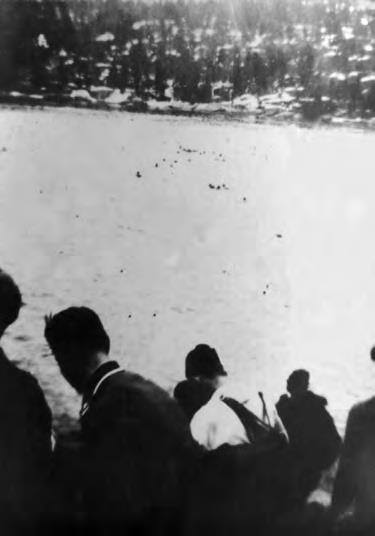
Around Fritz, the crew and army soldiers stand close together. The army men stand perplexed and look out over the oil-filled sea. PHOTO: From the book "Blücher" by John. H. Østby.
Courtesy of Ove Andre Østby and Wera Forlag.
difficult to understand what he is saying. With all the front teeth in his upper jaw gone, it's difficult to speak. What's more, he's still bleeding and the taste of blood is nauseating.
Barrel ends
Fritz is standing near the stern on the port side. It's not far down to the water. He decisively takes off his footwear. He ties his boots together and hangs them round his neck. Fritz looks towards Askholmene. In the water, many soldiers are struggling against the cold, the weight of their equipment and the distance to the four islets that together form Askholmene. He hears clear cries for help. Around him, the soldiers press together. They want to avoid ending up in the sea at all costs.
Towards Askholmene
Fritz is ready! He goes for it and jumps. At the same time, he hugs his boots to his body. The dark, ice-cold seawater feels fine. Fritz is full of adrenaline and hardly notices the cold sea water. He swims quickly towards the islets. Right next to him, an army soldier is forging ahead. He is gasping for breath and using a lot of effort to stay afloat. Fritz realises that he has a rifle hanging around his neck. As Fritz is about to pass him, he suddenly disappears underwater. Fritz changes direction towards where the soldier disappeared. The young boy is gone!
Now Fritz feels that the icy water is draining his strength. His hands are heavy as lead. It's still a couple of hundred metres to the nearest islet. Determined, he continues the swim. He passes several army soldiers. Some are panicking and fighting a desperate battle against the forces of nature. Others are shouting for mum. Still others are crying foul. Fritz swims on, no longer caring about those around him. He must soon find solid ground under his feet. If not, he will die!
"Help me! Help..." A desperate soldier can't take it anymore, and seconds later he sinks. Fritz is only a few metres behind him. There are only a few ripples on the surface of the water that reveal that a soldier was here just a few seconds ago. This time Fritz doesn't stop. He swims on. Askholmene is close now. It's only a matter of 15-20 metres. He struggles on. There he feels solid ground under his feet! Cold, tired and with no feeling in his body, Fritz crawls up the

land and remains on the ground. Behind him, smoke billows out from the Blücher. The water is teeming with people.
Richard
Up on deck, people are standing like herring in a barrel. The ship tilts more. For a moment, the entire crowd loses its balance. Some fall while most manage to stay on their feet. Richard strides purposefully past the frightened, confused army soldiers. He knows where to find life jackets. It's all about securing a vest! In a closed box on the deck there are several life jackets. Richard rips open the lid and grabs a life jacket. Now he has to find a suitable place to get out into the water. He searches aft. It looks like the easiest place to get all the way down into the sea. As he approaches the water, he notices an army soldier clinging to the rail.
Helmut
The soldier is shouting a woman's name across the sea. It is clear that he is terrified! Suddenly he starts to pray. Tears are flowing. in torrents. Richard pauses. He can't help but feel sorry for the young man. Suddenly, the soldier starts shouting across the sea again. Richard hears what he is shouting. "Monika, Monika! My beloved. I'm going to die!" Richard grabs him and shouts: "Come with me and we'll swim to shore." The soldier turns towards him and hiccups: "I can't swim! I can't!" Richard realises what he has to do if he is to get the soldier into the water. "Here! Put on this lifejacket. Then you won't sink." Richard helps the soldier on with the vest. "There, now you're coming with me!" Instinctively, the young man grabs his rifle. Richard rips it out of his hands and throws it into the sea.
"If you want to live, leave all your equipment here and follow me!" Richard stares intently at the soldier who nods weakly.
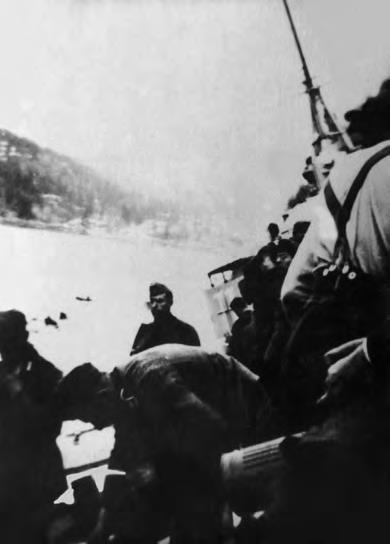
Richard strides purposefully past the frightened, confused army soldiers. He knows where to find life jackets. It's all about securing a vest! PHOTO: From the book "Blücher" by John. H. Østby. Courtesy of Ove Andre Østby and Wera Forlag.
Down by the sea, Richard grabs the soldier and asks: "What's your name?" "Helmut", he replies in a low voice. Suddenly the heavy cruiser turns again. The sea is coming towards them. The icy water hits Richard and Helmut. They let go of Blücher. Helmut begins to gasp for breath. The cold sea water paralyses him. He screams in pain and terror. Around him there are more soldiers. Some disappear before his eyes. Desperately, he turns round and looks for Richard. Where is Richard? He shouts for help in the confusion that surrounds him.
Richard almost loses his breath as the sea water envelops his entire body. He looks round for Helmut. Where the hell has he gone? He was here a few seconds ago. The sea is teeming with uniformed men. They are fighting for their lives. Helmut can't be far away! Richard feels discouragement descend on him.
"Helmut!", Richard shouts at the top of his lungs. Suddenly he hears a voice calling for Monika! Just 2-3 metres away is Helmut. Between the two strangers
Several of the "friends" are trying to make their way towards Askholmene. Richard takes a couple of strong strokes and makes his way over to Helmut. He shouts briefly: "Follow me", and starts swimming towards the islets. Even though Helmut is wearing a life jacket, it's not easy to keep up with someone who can't swim. Richard keeps turning round to see that Helmut is following him.
It's not just the freezing water that's a big challenge. Twice in quick succession, Richard has to push away fellow soldiers who can't take it anymore and grab hold of him in a panic. They drown seconds later. Helmut also falls victim to the panic of others. He gets water in his mouth and has to stop for a moment to catch his breath. Two desperate fellow soldiers grab him when they see he is wearing a life jacket. They themselves are sinking and grab hold of everything and everyone. Helmut is pulled underwater, gasping for air. A short time later he floats up. He is dead.
Askholmene
Richard realises that Helmut is gone. He has to think about himself. Determined, he swims towards the islets that are getting closer and closer. His hands are completely numb. There aren't many people around him now. Many have disappeared on the two to three hundred metre swim. He continues doggedly. As he takes a mouthful of water, he realises that there is a lot of oil in the sea. The glow of the fire on board is occasionally visible through the thick smoke. "Bloody hell! I've got to get into the islets before the oil ignites. Then there'll be hell to pay!" With the last of his strength, he makes his way to the northernmost islet. It is the largest of the four islets. It is already full of soldiers. Strong hands pull him up the last few metres.
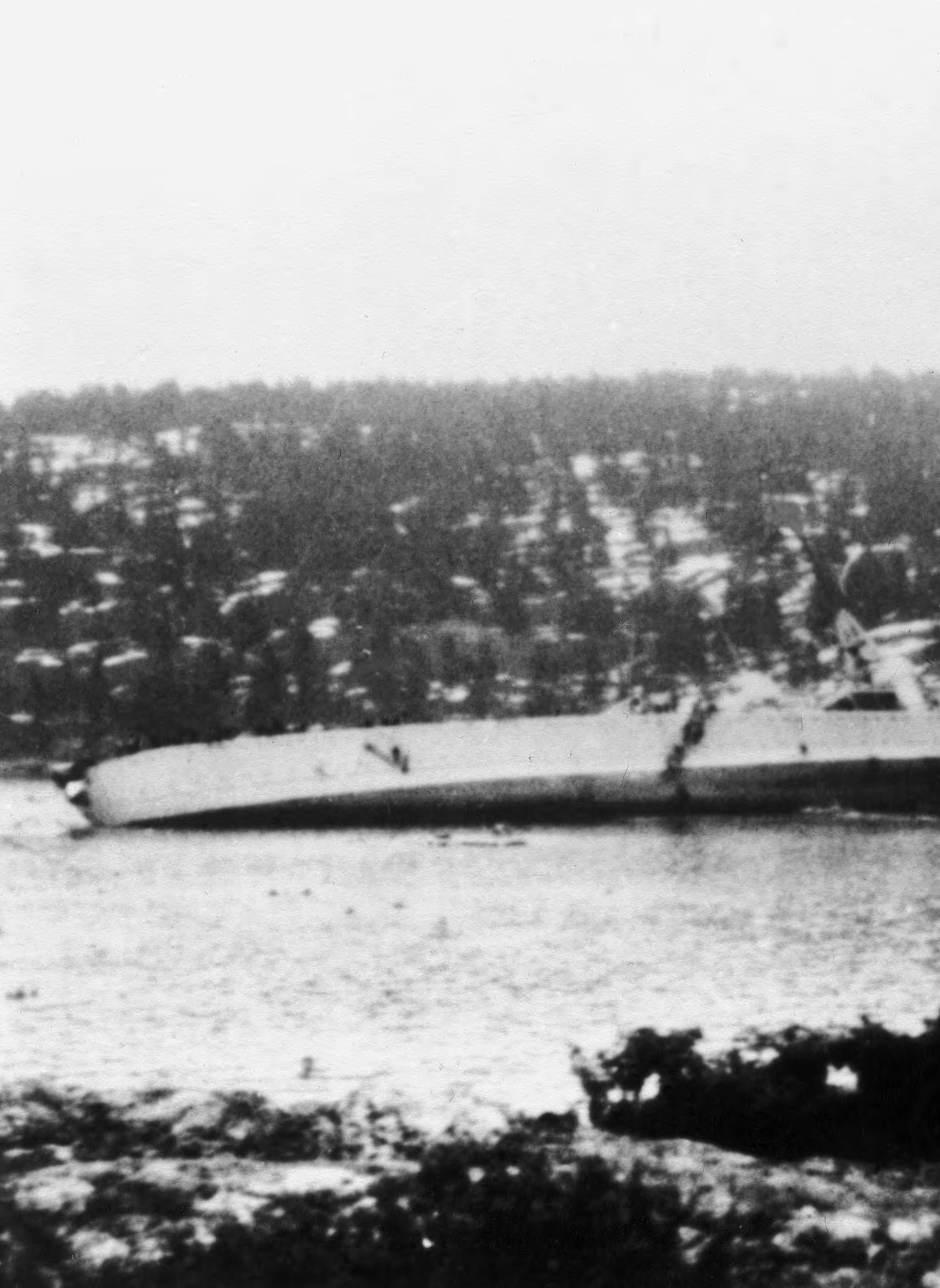
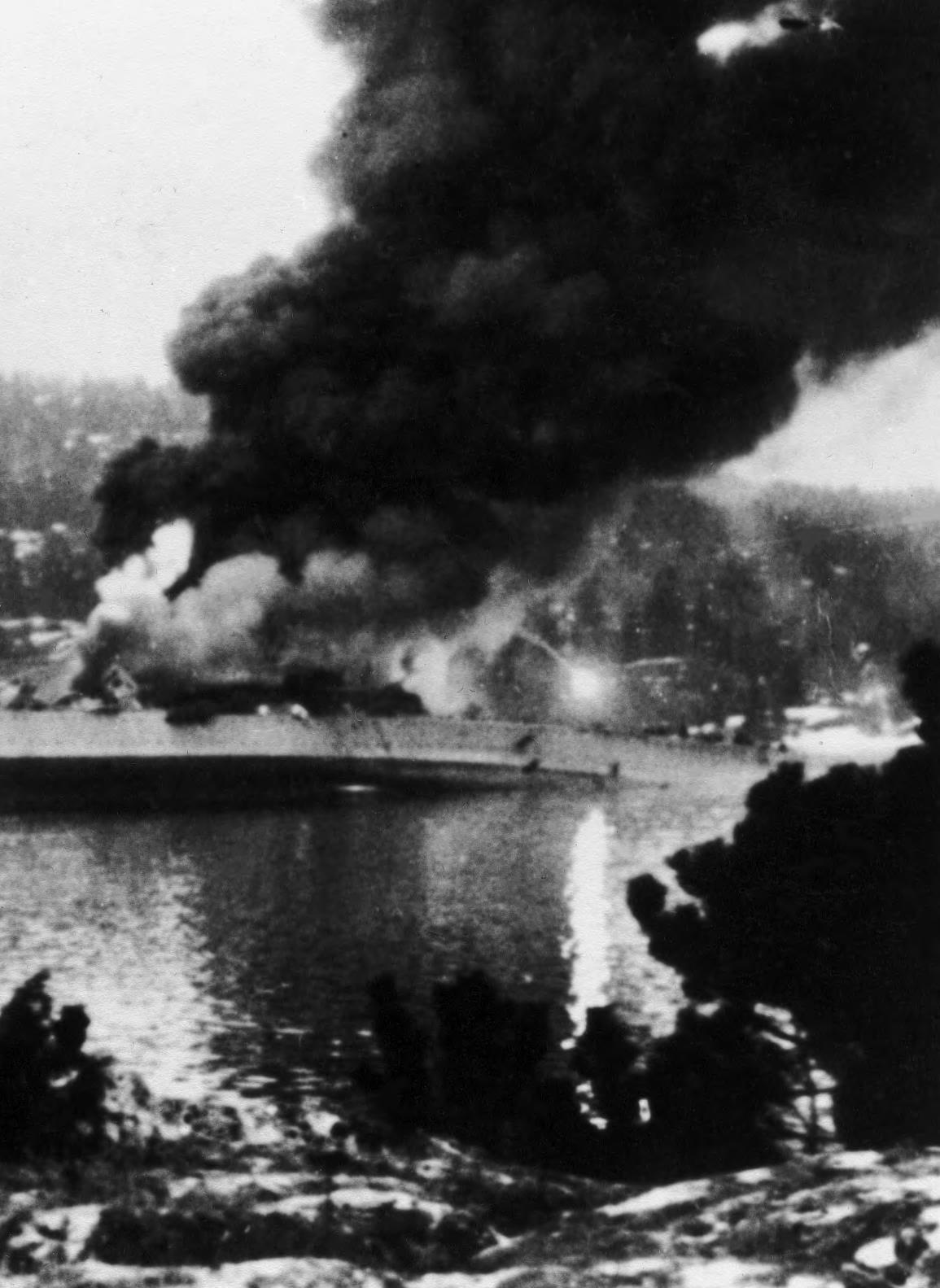
Richard is making his way towards the stern, when he realises Helmut is standing paralysed and looking out over the icy sea.
Willi has to do some climbing to get down to the sea. The Blücher now has such a large list that it can't be long before the cruiser sinks. Willi's rucksack slows him down considerably. He throws the sack down towards one of the bulkheads. He then lies down on his stomach and lets go of the rail. He slides downwards and hits the steel bulkhead feet first. The pain from his left knee cuts through his body and he screams. Stunned, he grabs his rucksack and crawls on. A number of soldiers have gathered in front of him. It's clear that most of those who can swim, or have got hold of a life jacket, have left the sinking vessel. Willi hears the frightening, sharp sound of steel plates being twisted. It's as if the big cruiser is groaning in a desperate attempt to stay afloat. Slowly, he makes his way down towards the surface of the water. Half of his body feels numb. The intense pain in his knee has somehow paralysed his entire leg and part of his hip. Willi drags his rucksack along with him. "We need to get into the sea as quickly as possible now. The ship can't possibly stay afloat for much longer.
As Willi grabs the edge of an open hatch, the steel colossus twists without warning. Willi falls and quickly slides down the almost vertical deck. Instinctively, he reaches for something to break the impact with the port row. The row is partially submerged, but not deep enough for Willi to avoid a brutal encounter with the steel bars and wires. The shock of the collision and the encounter with the icy water sends him into a full-blown panic. Willi roars out a plea for help. He cries out for his dear, safe, good mum. His breathing is completely out of control. His heart is beating like a steam hammer, and he's clutching a lone lifejacket that comes drifting past. After a couple of minutes, he has drifted slightly away from the sinking vessel. He begins to regain control of his body and slowly starts the long journey towards Askholmene.
Around Willi lie dead and badly injured soldiers. They float in the oil-mixed seawater. From time to time, he sees some swimming with mechanical movements towards the nearest islet. Gradually, a strange calm fills the place. It's as if the cruiser and its crew have come to terms with the fact that they have been "beaten up". A kind of indifference characterises the situation. It will have to go as it goes. "Where's the rucksack?" Willi suddenly remembers his rucksack. It contains a change of uniform and personal items that are useful and important to him. The oil-mixed seawater opens his mouth. The taste of oil is awful and he vomits. The experience makes Willi focus on the swim strokes ahead. The rucksack is gone.
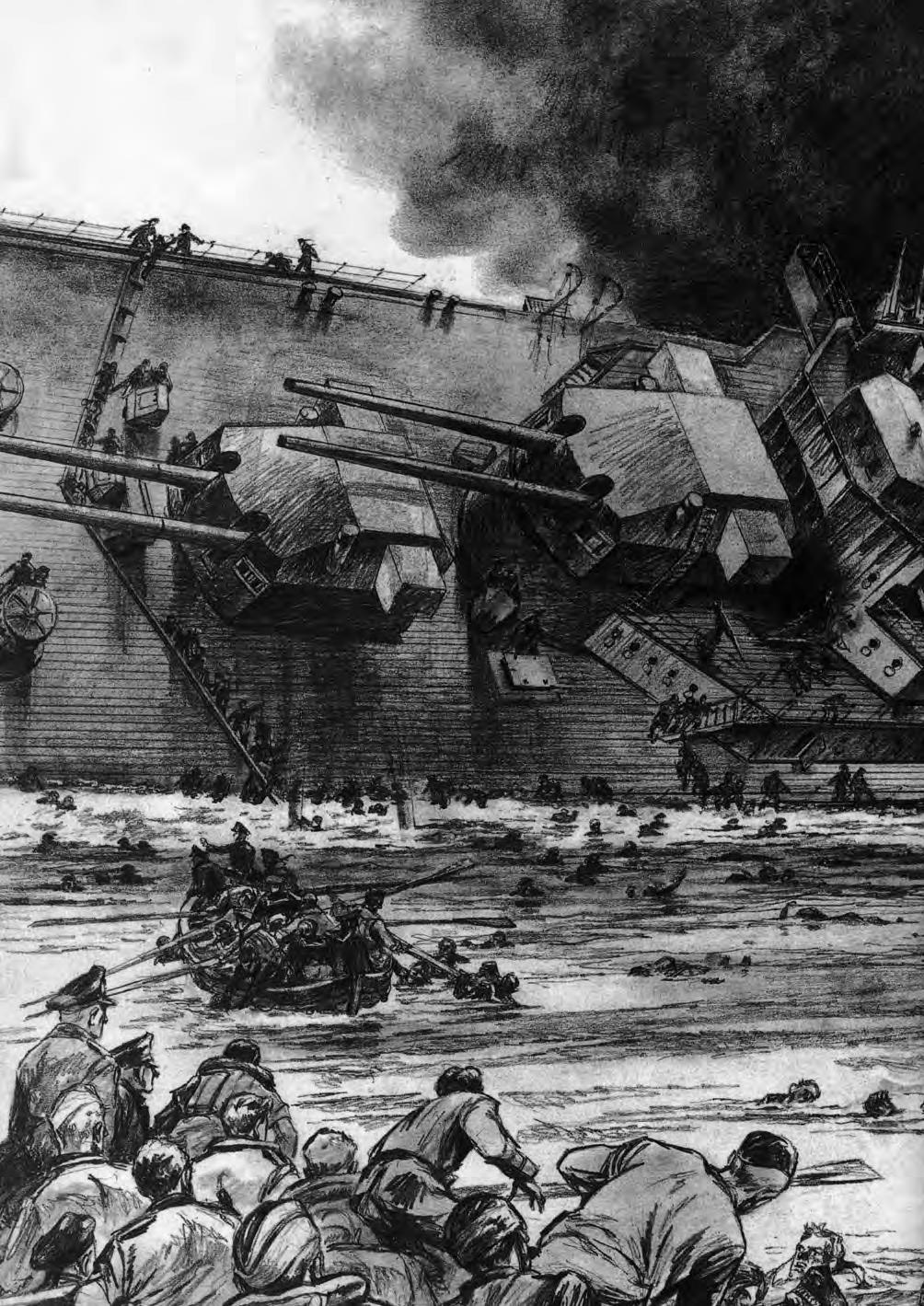
Willi has to do some climbing to get down to the sea. The Blücher now has such a large list that it can't be long before the cruiser sinks.
From the book "Blücher" by John. H. Østby/Andreas Hauge (illustrator) Courtesy of Ove Andre Østby and Wera Forlag.
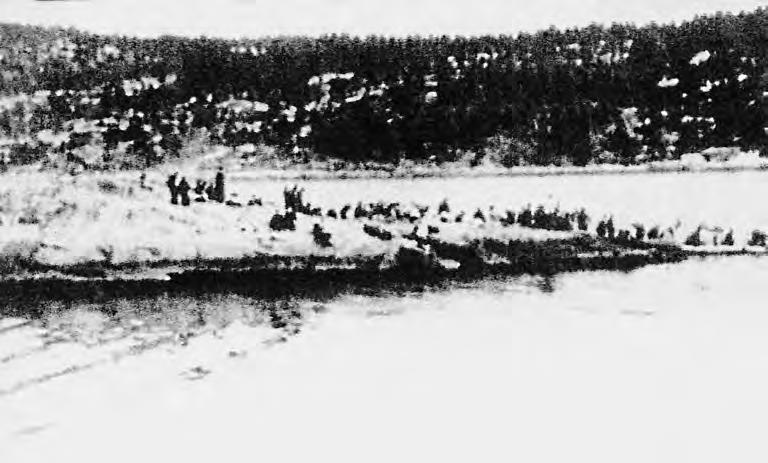
Willi is now so close to the islets that he can clearly see his fellow soldiers. PHOTO: From the book "Blücher" by John. H. Østby. Courtesy of Ove Andre Østby and Wera Forlag.
Calmly he says forward. He passes an oil-covered body bobbing on the surface. There is still some way to go to the islets, and Willi struggles on. Swim stroke by swim stroke, the distance is getting shorter. He's doing well now. He no longer feels the pain in his leg. His hands are becoming powerless, but the islands are getting closer.
The sea is on fire!
Willi is now so close to the islets that he can clearly see his fellow soldiers. Many of them clearly bear the marks of what they have been through. What are they trying to do now? Several of them are waving their arms and pointing out to sea towards Blücher. Willi is so exhausted that he is about to collapse. Completely exhausted, he stops swimming and looks back. At the same moment, the stern of the German cruiser disappears. Just as the water swallows the propellers, a powerful explosion erupts from the vessel. The flame rises several metres into the air.
A moment later, the sea is on fire. The oil that has leaked from the Blücher has been ignited. Seconds later, Willi sees the flames coming towards him. He hears more screams from some of those further out. Desperate, he swims towards the largest hole. There aren't many metres left! Now he hears the fire right behind him! A split second later, he is enveloped in the deadly flames. He screams in pain and fear. Without realising where he's swimming, he gives it everything he's got. The pain
The oil leaking from the Blücher has been ignited. Seconds later, Willi sees the flames coming towards him. PHOTO: NTB
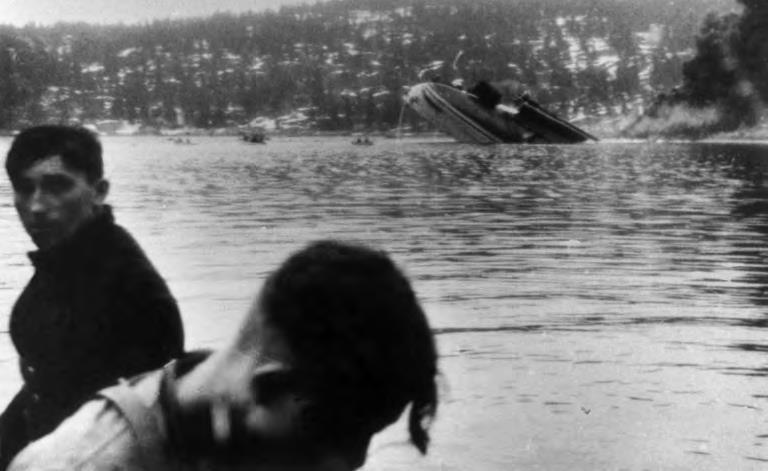
of the flames burning against the bare skin on the right side of his face and neck, almost paralysing him. Panic grips him anew. Willi is fighting! The flames lick around his body. His right hand and left thigh are burned. Willi feels that he is about to faint. He can't take any more. Just before he sinks, he feels several hands pulling him up onto the hard rock.
After Kapitän zur See Heinrich Woldag gives the order to drop anchor, Blücher turns 180 degrees. The vessel remains lying with its bow to the south and its stern to the north, roughly in the centre of the strait between Askholmene and Marikova/Langebåt. The cruiser then starts to list to port. Gradually, the list increases and the bow disappears under water. The large cruiser spins around and the keel comes up as the bow hits the bottom 90 metres below sea level. Back on the surface, only the stern is visible, slowly sinking deeper. As the sea surface closes over the propellers, the stern continues down into the depths and eventually stops at a depth of 59 metres.
The vessel is partly upside down. It is leaning against a solid rock wall approximately amidships. Towards the bottom, parts of the superstructure are crushed and compressed by the weight of the rest of the hull. The stern protrudes into open water.
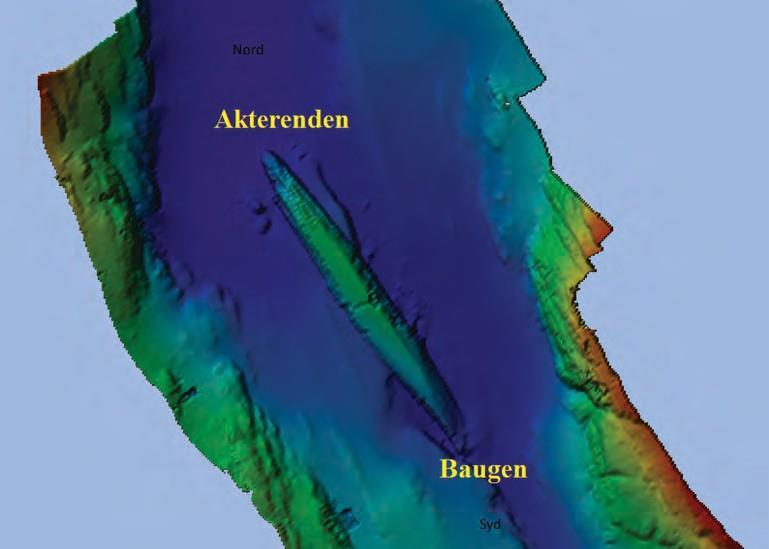
Over the years, a large crack has appeared in the hull a little aft of amidships. The weight from the stern is putting a lot of strain on the hull, and the crack is getting bigger and bigger. At the same time, the shallowest point at the propeller loops is getting deeper. Today, the shallowest point on the wreck is 64 metres.

The sonar image shows how the stern stands straight out in open water, forming the wreck's shallowest point. Approximately amidships, the wreck has developed a kink that is a clear sign that decay is well underway. The photo is taken from east to west. Photo: MPC Service C Engineering, Kongsberg Maritime Subsea v/ Project Engineer Rune Smith Johansen.
Sources:
– Bundesarchiv (2021-22-23) (These documents have been translated into Norwegian by Guttorm Wiik)
– "Blücher" A documentation in pictures by John H. Østby ISBN: 978-82-92867-03-7 Wera Forlag
– en.wikipedia.org/wiki/German_torpedo_boat_Tiger_(1928). Retrieved 4 May 2021.
– en.wikipedia.org/wiki/Gdynia. Retrieved 4 May 2021.
– en.wikipedia.org/wiki/Wilhelmshaven. Retrieved 5 May 2021.
– en.wikipedia.org/wiki/Uhlandbad. Retrieved 5 May 2021.
– en.wikipedia.org/wiki/Glückstadt. Retrieved 5 May 2021.
– en.wikipedia.org/wiki/Wesermünde. Retrieved 8 May 2021.
– en.wikipedia.org/wiki/Fürstewalde. Retrieved 8 May 2021.
– en.wikipedia.org/wiki/Ludwigshafen. Retrieved 10 May 2021.
– en-wikipedia.org/wiki/Oskar_Kunnetz. Retrieved 12 May 2021.
– Emden - cruiser (1925) in Store norske leksikon på snl.no. Retrieved 7 January 2023 from https://snl.no/ Emden_-_cruiser_(1925)
– en.wikipedia.org/wiki/Usedom. Retrieved 7 January 2023.
– swinemuende.eu/der_hafen.htm. Retrieved 7 January 2023.
– Folke, Hans; Pihl, Roger: Anholt in Store norske leksikon på snl.no. Retrieved 8 January 2023 from https://snl.no/ Anholt
– en.wikipedia.org/wiki/Anholt. Retrieved 8 January 2023.
– Jensen, Egon; Serritslev, Lars: Hirsholmene in Den Store Danske på lex.dk. Retrieved 8 January 2023 from https:// denstoredanske.lex.dk/Hirsholmene
– en.wikipedia.org/wiki/Hirsholm. Retrieved 8 January 2023.
– en.wikipedia.org/wiki/Fredrikshavn. Retrieved 8 January 2023.
–
–
Lauritzen, Per Roger: Færder fyr in Store norske leksikon på snl.no. Retrieved 8 January 2023 from https://snl. no/F%C3%A6rder_fyr
Lauritzen, Per Roger: Torbjørnskjær fyr in Store norske leksikon på snl.no. Retrieved 8 January 2023 from https://snl. no/Torbj%C3%B8rnskj%C3%A6r_fyr
– Lundbo, Sten; Mæhlum, Lars: Bolærne in Store norske leksikon på snl.no. Retrieved 8 January 2023 from https://snl. no/Bol%C3%A6rne
– Brakestad, Aksel Schreiner; Leraand, Dag: Leif Welding Olsen in Store norske leksikon på snl.no. Retrieved 8 January 2023 from https://snl.no/Leif_Welding_Olsen
– en.wikipedia.org/wiki/Leif_Welding_Olsen. Retrieved 8 January 2023.
– en.wikipedia.org/wiki/HVB_"Pol_III". Retrieved 8 January 2023.
– nl.wikipedia.org/wiki/Siegfried_Strelow. Retrieved 8 January 2023.
– Hammer, Erlend; Berg, Ole F.: Oscarsborg Fortress in Store norske leksikon på snl.no. Retrieved 8 January 2023 from https://snl.no/Oscarsborg_festning
– Fjørtoft, Jan Egil: Birger Eriksen in Norsk biografisk leksikon på snl.no. Retrieved 8 January 2023 from https://nbl. snl.no/Birger_Eriksen
– seilskuteklubben.no/index.php?option=com_content&view=article&id=572:kanonene-paoscarsborg-festnin- gens-historie-og-begivenhetene-9-april-1940&catid=828ltemid=213. Retrieved 10 January 2023.
–
en.wikipedia.org/wiki/Oscarsborg_fortress. Retrieved 8 January 2023.
– en.wikipedia.org/wiki/Askholmene_(Frogn). Retrieved 8 January 2023.
– Dieter Fleck (son of Richard Fleck) (Various emails 2021-22)
– Fritz Hilgemann (personal interview in 1994)
– "The cruiser Blücher" by Frank Binder and Hans S. Schlünz. ISBN: 82-540-0151-0 Faktum Forlag
– Hospital records from Rikshospitalet (Edited by Dr Ine Røed)
– The diary of Willi Schlüricke (translated into Norwegian by Inger Lise Toft)
– Kåre Bergh-Smith (professional quality assurance of words/expressions and tasks in the machine)
– Knut Haadem (Explanation of the technical drawings)
– Jürgen Schlüricke (son of Willi Schlüricke)
– Michael and Andreas Schlüricke (grandsons of Willi Schlüricke)
– Video from Oscarsborg Fortress. Part 6 "The cruiser Blücher, how was it constructed and why was the result so fatal?" Narrated by Morten Svinndal, Oscarsborg Museums.
(1) Tiger was a Type 24 torpedo boat, the third of six similar vessels built for the German navy in the 1920s. The vessel was 92.6 metres long and could reach a speed of 34 knots.
(2) Gotenhafen is a city in Poland and an important harbour on the Bay of Gdansk on the southern coast of the Baltic Sea. The city was conquered and annexed by Germany in September 1939. 50,000 Polish inhabitants were driven out. Their properties were confiscated and given to German settlers. The harbour was largely destroyed when German troops withdrew in 1945.
(3) The port facility in Wilhelmshaven was built in 1856 and was named on 17 June 1869, after King Wilhelm of Prussia. The harbour is one of the German Navy's most important naval bases.
(4) Tübingen is a city in south-west Germany. Uhlandbad is the first indoor swimming pool in Tübingen. It was inaugurated in July 1914 and is still in operation today.
(5) Glückstadt is a town founded by the Danish king Christian IV in 1617. The town is located at the lower part of the river Elbe in Holstein.
(6) Wesermünde was a town in the Prussian province of Hannover. It was formed in 1924 and renamed Bremenhaven in 1947. The city is located in north-west Germany on the North Sea.
(7) Fürstenwalde is a city located on the River Spree in the state of Brandenburg in the north-east of Germany.
(8) Ludwigshafen is a city in south-west Germany, located on the west bank of the river Rhine. The city is not far from the French border.
(9) Stranderbukten is located near the harbour city of Kiel, in the north of Germany.
(10) Rear Admiral Oskar Kummetz was born on 21 July 1891 in Neidenburg in East Prussia. He also served in the German Imperial Navy during the First World War. Kummetz was awarded the Knight's Cross of the Iron Cross for his actions during the sinking of the Blücher. He had a son, Hans-Erich Kommetz. Oskar Kommetz died on 17 December 1980, aged 89.
(11) The school cruiser Emden was 155.1 metres long and 14.3 metres wide. The vessel had a top speed of 29 knots and a crew of 630 men. Emden was heavily damaged on 9 or 10 April 1945 after a bombing raid. The vessel was scrapped in 1947.
(12) Usedom is an island in the Baltic Sea on the border between Germany and Poland. The largest town on the island is Swinemünde. The town was an important harbour for the German Kriegsmarine. On 12 March 1945, Swinemünde was heavily bombed by American forces. The Americans deployed 661 B-17 Flying Fortress and B-24 bombers. At least 23,000 people were killed. After the war, the city was occupied by Stalin's Red Army. Following a Soviet initiative, Swinemünde was returned to Poland.
(13) Eichstaden is a harbour area in the city of Swinemünde
(14) The torpedo boats Möwe, Albatros and Kondor were all equipped with 3 x 10.5 cm cannons and 4 x 10.5 cm guns. 10.5 cm guns and 4 pcs. 20mm antiaircraft guns. In addition, they had 6 pcs. 53.3 cm torpedo tubes. They belonged to the "Type 23" class. The torpedo boats were 87.7 metres long and had a top speed of 33 knots. The vessels were manned by 4 officers and 116 crew.
(15) The island of Anholt is part of Norddjurs municipality, Central Denmark Region. The island is known as Northern Europe's largest desert. It was the result of large-scale logging in connection with the rebuilding of the Danish navy after Denmark lost its naval fleet to Britain during the Napoleonic Wars in 1807.
(16) Hirtsholm is a Danish island that is part of the small archipelago Hirtsholmene. The archipelago is located in the northern part of the Kattegat, about 6 kilometres northeast of Frederikshavn. Hirtsholm is the only one of the 8 islands in the Hirtsholmene archipelago that is inhabited.
(17) Frederikshavn is a town in the North Jutland region of Denmark. During the Second World War, the town was part of the Germans' Atlantic Wall.
(18) Kapitän zur See Heinrich Woldag was born on 19 October 1892 and died under mysterious circumstances on 16 April 1940, aged just 47. Heinrich Woldag took command of the cruiser Blücher on 20 September 1939, and held it until 9 April 1940 when the vessel sank. Woldag died seven days after the sinking of the Blücher in a plane crash. He and aviator Walter Poplov, along with a third unknown man, were in the aircraft when the accident occurred. Woldag had flown to Berlin a few days earlier to explain the loss of Blücher. On 16 April, he returns to Norway to attend the funeral of the deceased. The plane he was travelling in crashed into the sea near Tofte in Hurumlandet.
(19) Pol III was built in 1926 at Akers Mekaniske Verksted. The vessel was 33.8 metres long with a top speed of 11 knots. Pol III was in service as a whaleboat from 1926 to 1939. In 1939, like many other whaleboats, it was chartered by the Norwegian Navy for use as a guard boat. Pol III made history when
under the command of Captain Leif Welding Olsen, spotted the German invasion fleet in the Oslofjord on the night of 8-9 April 1940.
(20) Leif Welding Olsen was born on 15 August 1895 in Horten. He was educated at the Norwegian Naval Academy. Welding Olsen was captain of the patrol boat Pol III when it came into battle with the German Battle Group 5 during the invasion of Norway on the night of 8-9 April 1940. Captain Welding Olsen was badly injured and died of his injuries shortly afterwards, aged 44.
(21) Commander Strelow was born in Kiel on 15 April 1911. In 1939, he was given command of the torpedo boat Albatros until it ran aground on 10 April 1940 near the Sisters archipelago at the end of the Oslofjord. In the summer of 1941, Strelow was given command of the submarine U435. He sank a number of ships. On 9 July 1943, U435 was spotted by an aircraft while in a surface position. The submarine was sunk. Captain Strelow perished along with the rest of the crew.
(22) Oscarsborg Fortress is a fortification that served as an inner defence ring in the Oslofjord. The fortress was built in 1848 with several expansions until 1905. It is located on Søndre Kaholmen in Drøbaksundet, just north of Drøbak. The torpedo battery is located on Nordre Kaholmen.
(23) Colonel Birger Kristian Eriksen was born on 17 November 1875, and died on 16 July 1958. He was 82 years old. Colonel Eriksen took the exam artium in 1893. He then entered the War College and graduated in 1896. He then joined the infantry as an officer. In 1899, he transferred to the newly established fortress artillery. He was appointed captain in 1901 and major from 1915. In 1918 he rose through the ranks to lieutenant colonel and in 1931 he became colonel. In 1933, he became commander of Oscarsborg Fortress.
(24) The Moses, Aaron and Joshua cannons are all located at Oscarsborg Fortress and point southwards. The three 28 cm Krupp cannons were installed in 1893. Moses was named after the 43.3 tonne gun barrel fell into the sea when it was being reloaded into a barge at Akers Mekaniske Verksted. It had to be salvaged, just like Moses in the Bible. The other two cannons were naturally named Aaron and Joshua.
(25) Kopåsbatteriet was subordinate to Oscarsborg Fortress. It is located on the Kopås hill in Drøbak. The battery was built in the years 1898-1900. The Kopåsbat- tery was decommissioned in 1974.
(26) Askholmene consists of four small islets in Frogn municipality in Akershus county. They are located 4.7 kilometres north of Drøbak church, with Håøya to the west and Marikova on the Nesodd peninsula to the east. The easternmost islet is protected as a nature reserve because of the bird life. On 24 July 1940, a
memorial to the fallen Germans was erected on Askholmene. When the island was liberated in May 1945, the memorial was demolished, but the foundations are still in place.